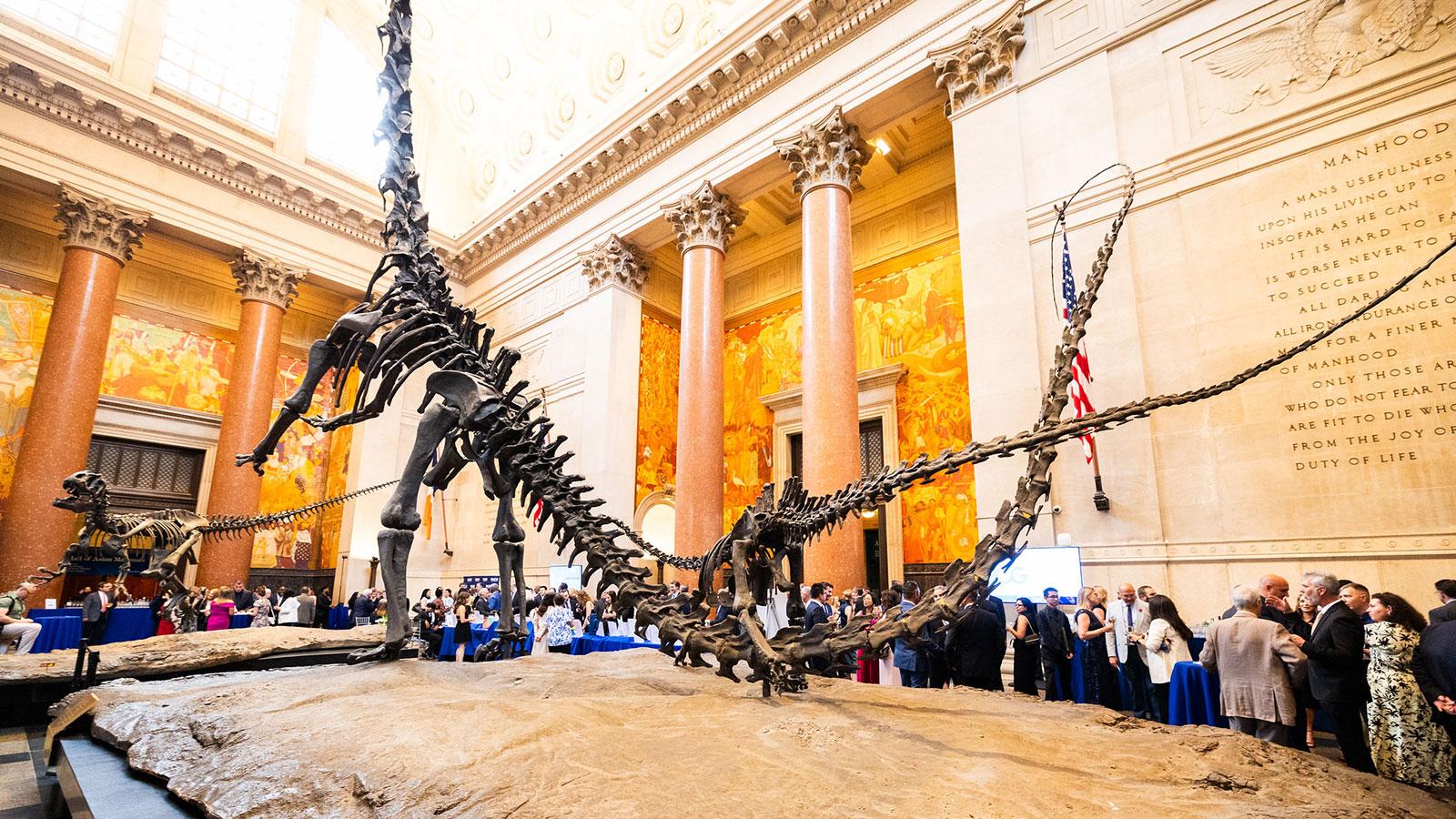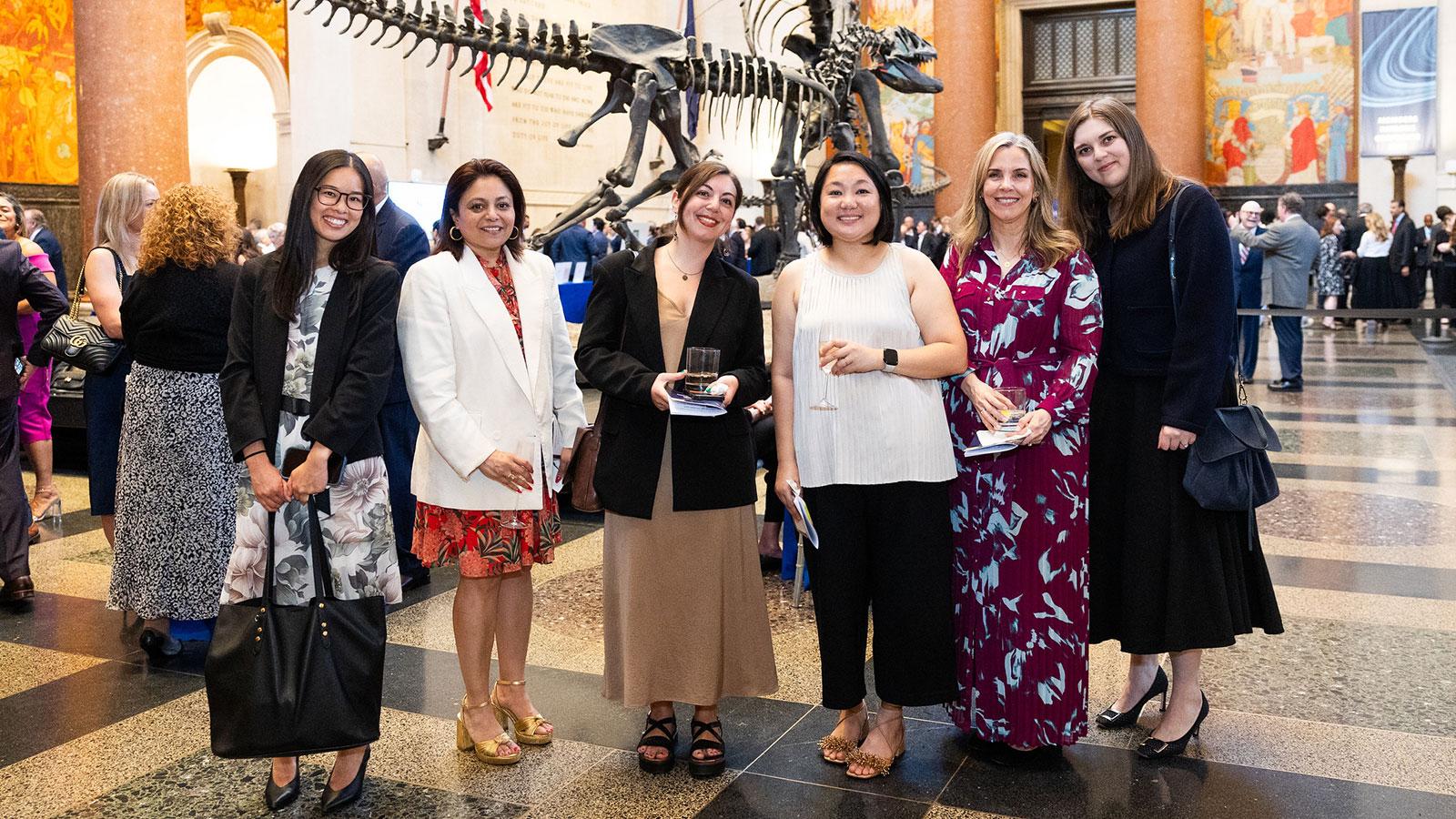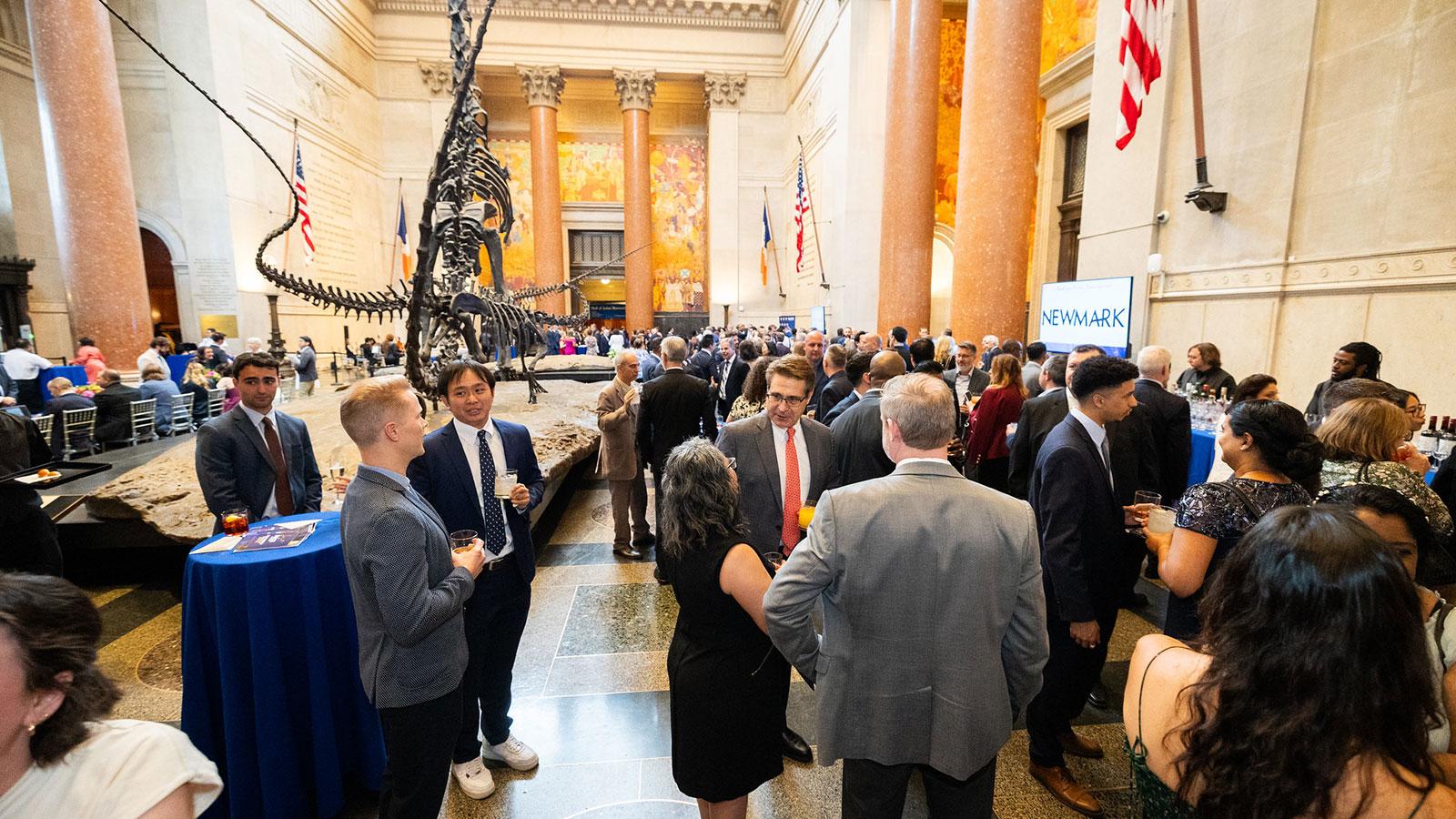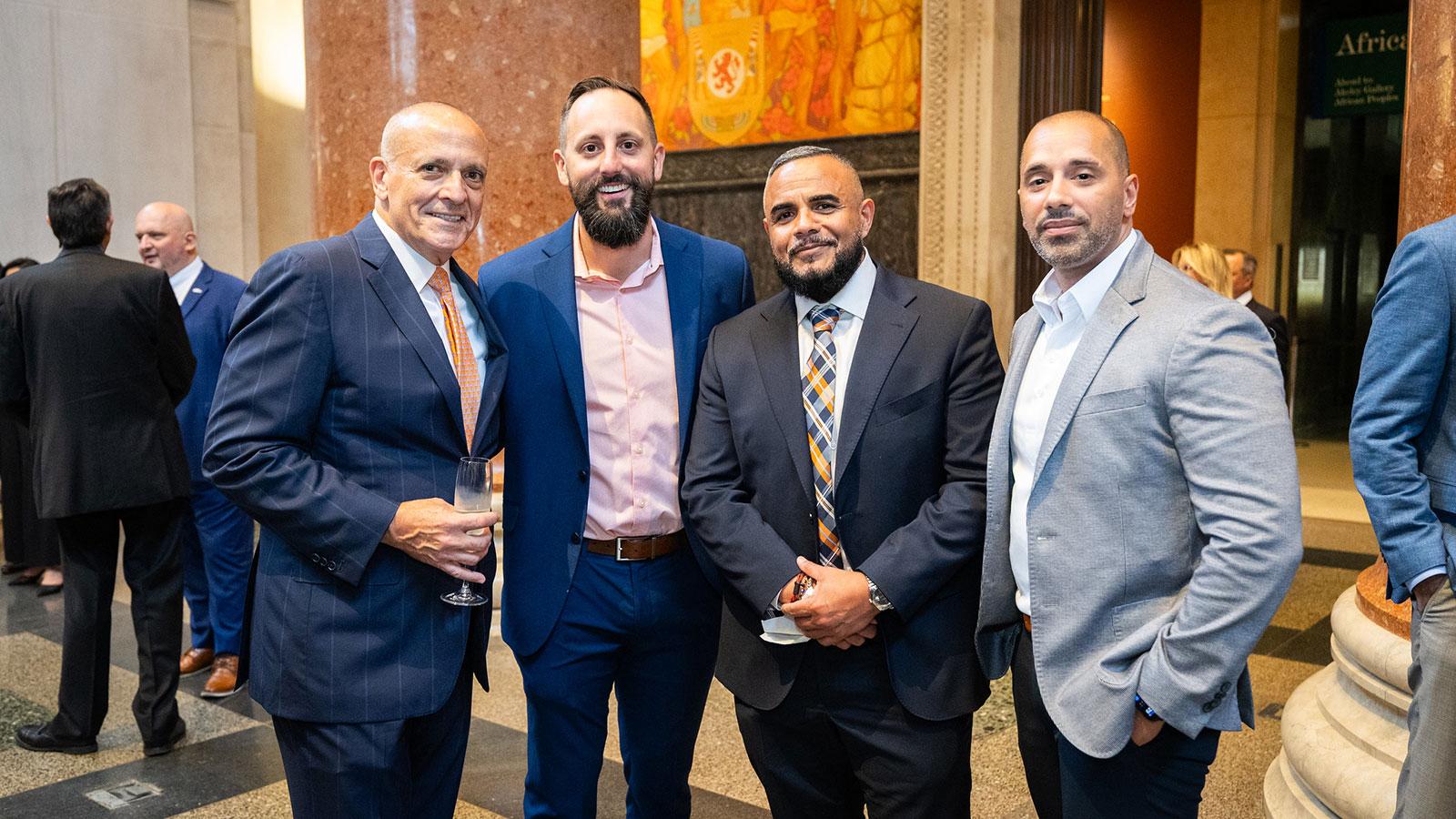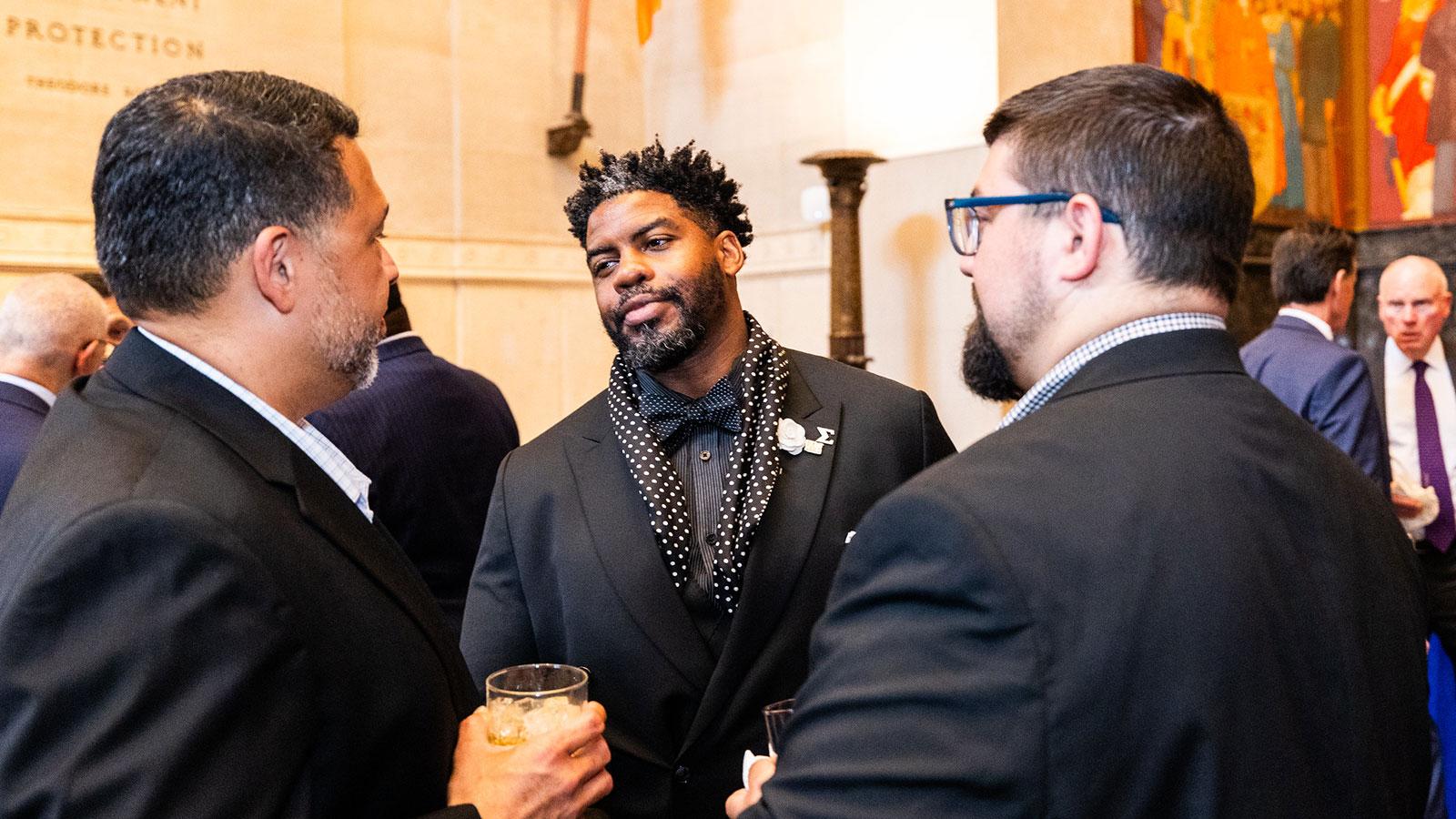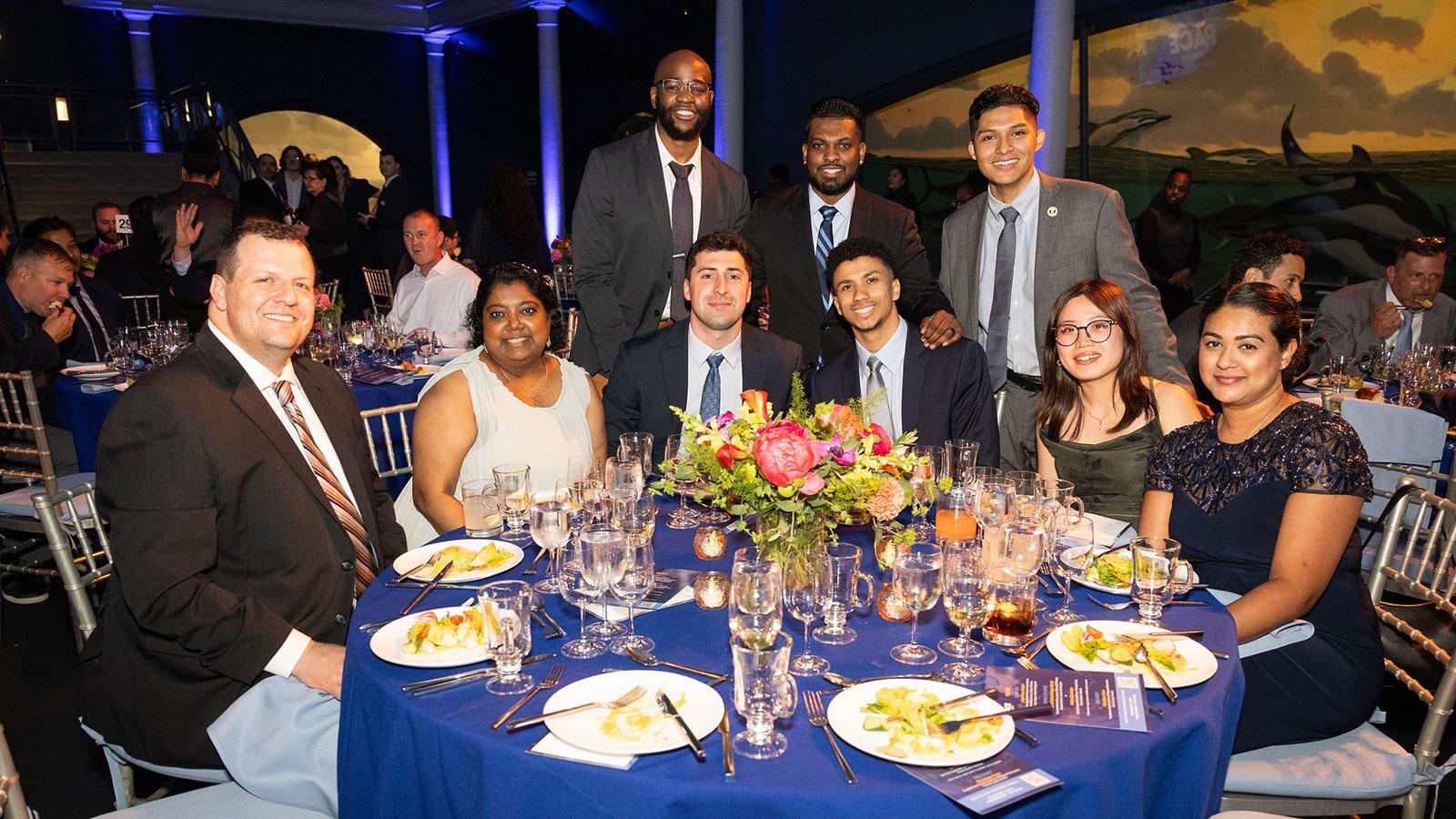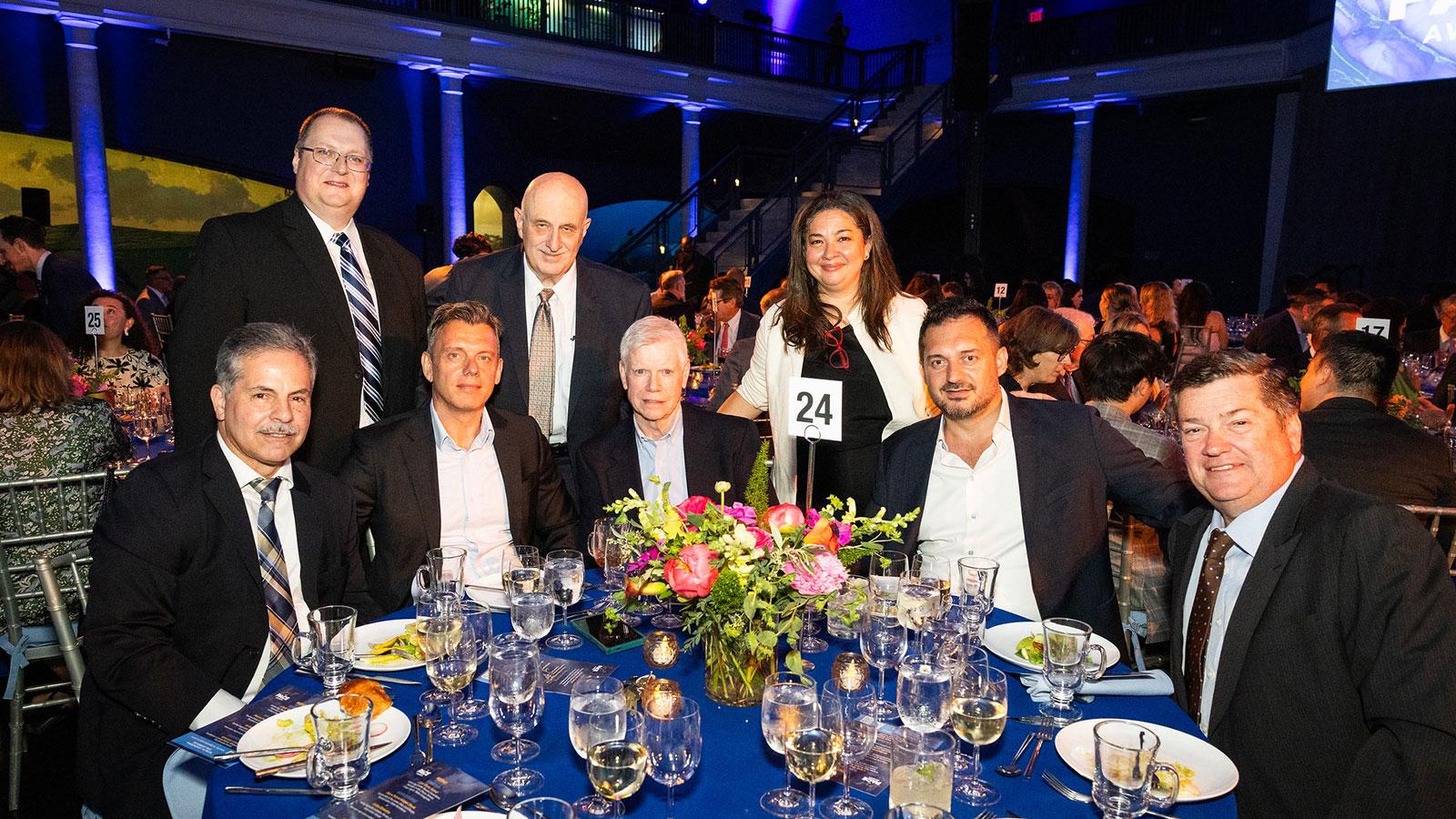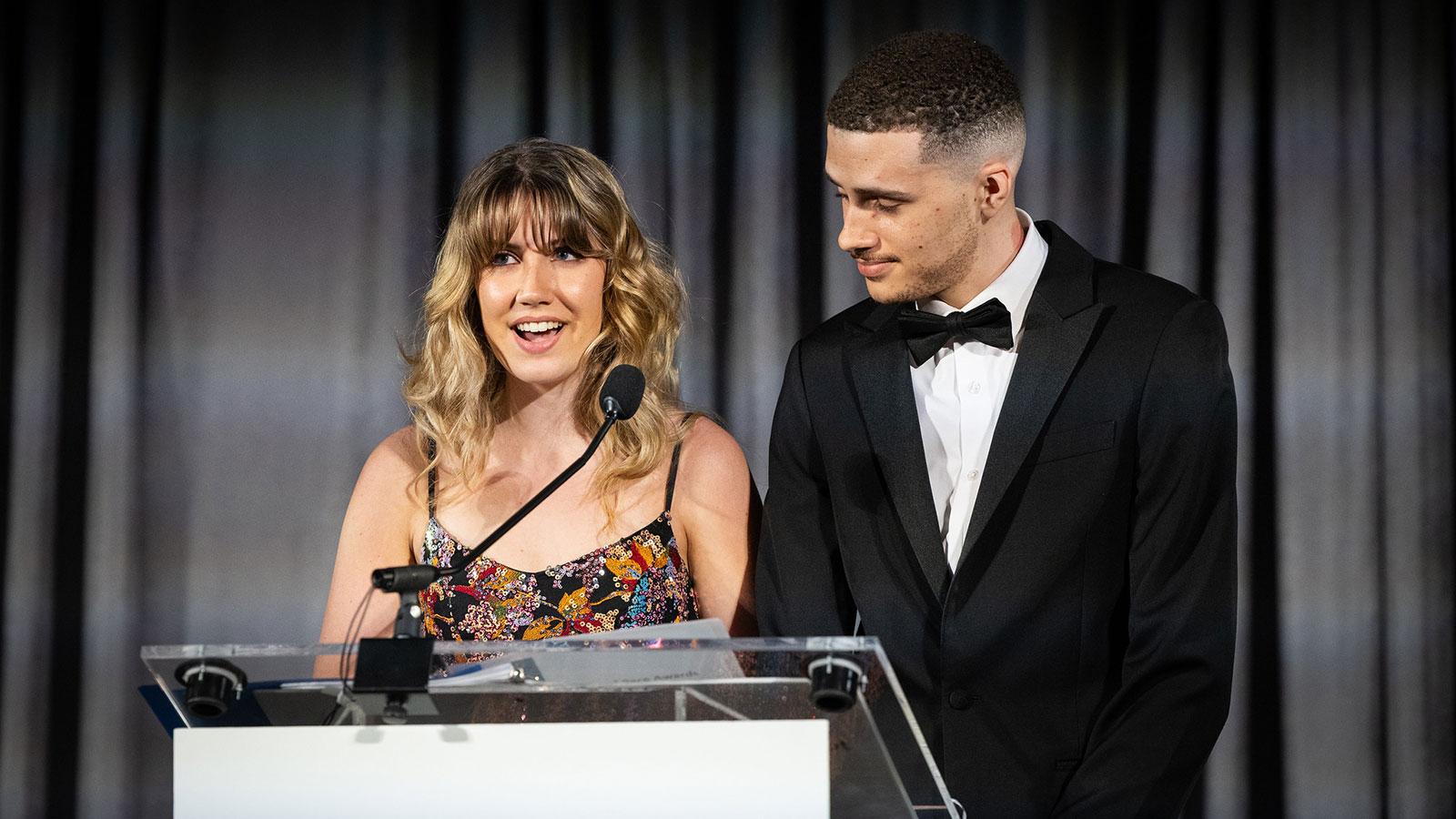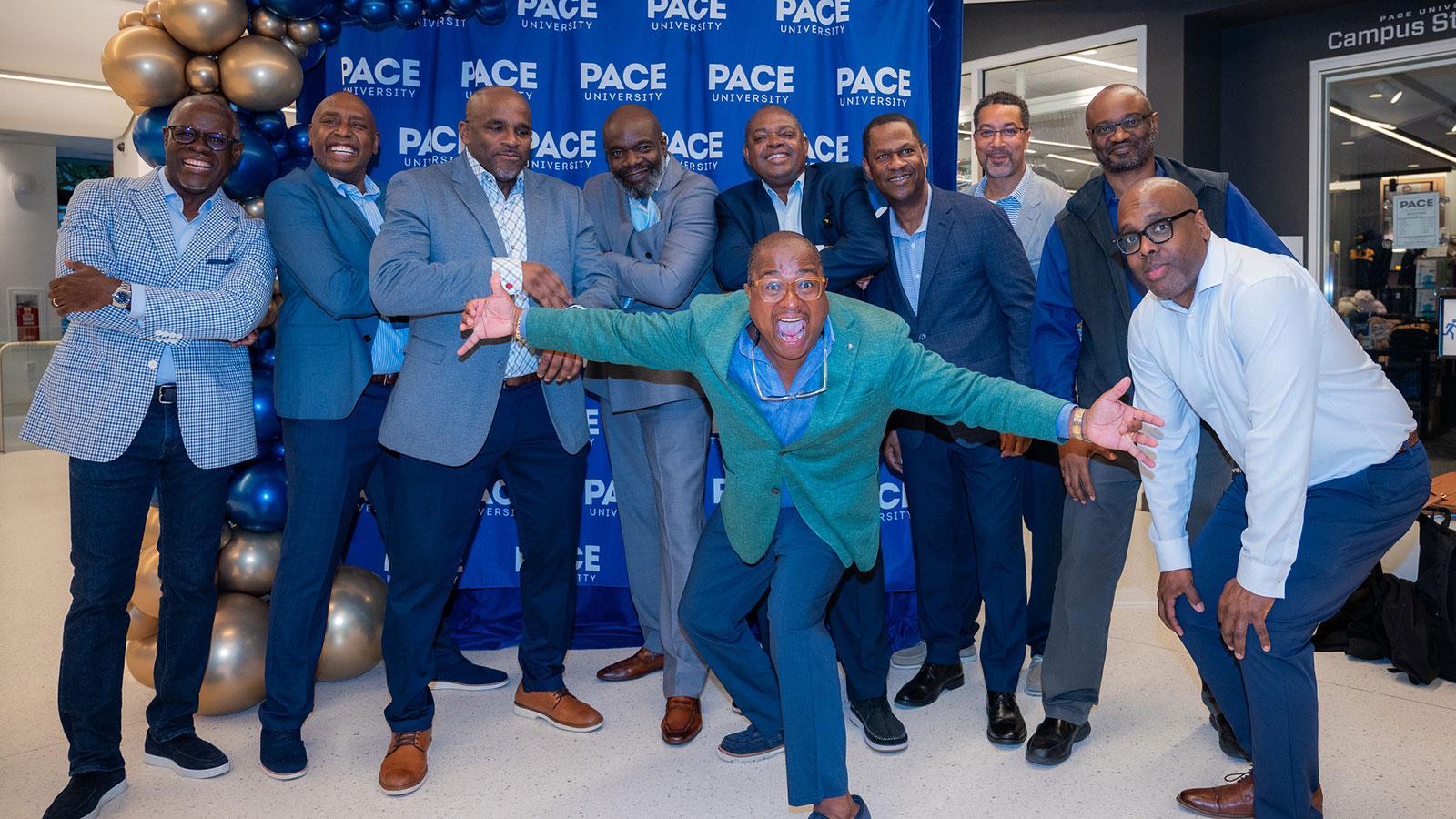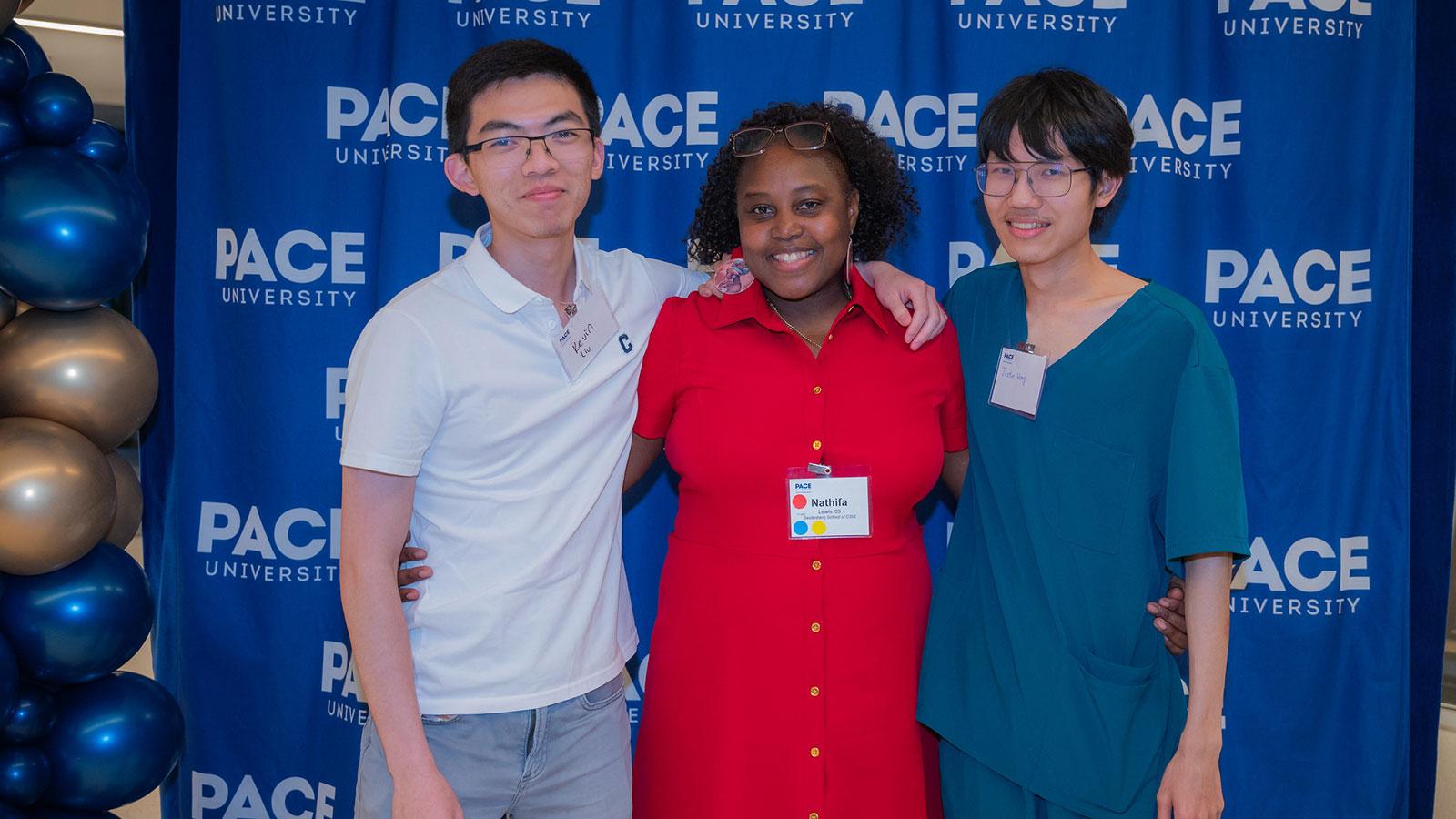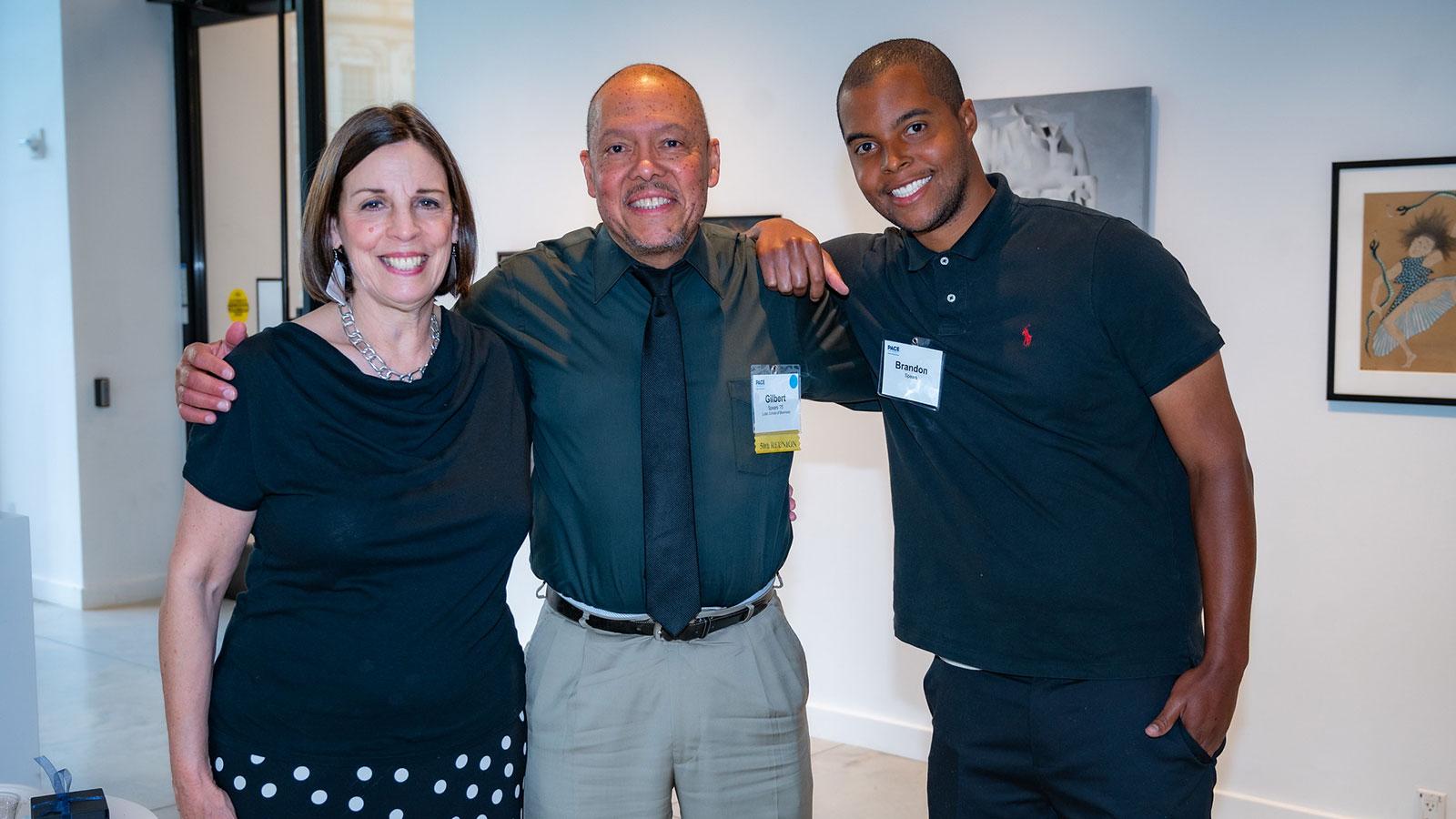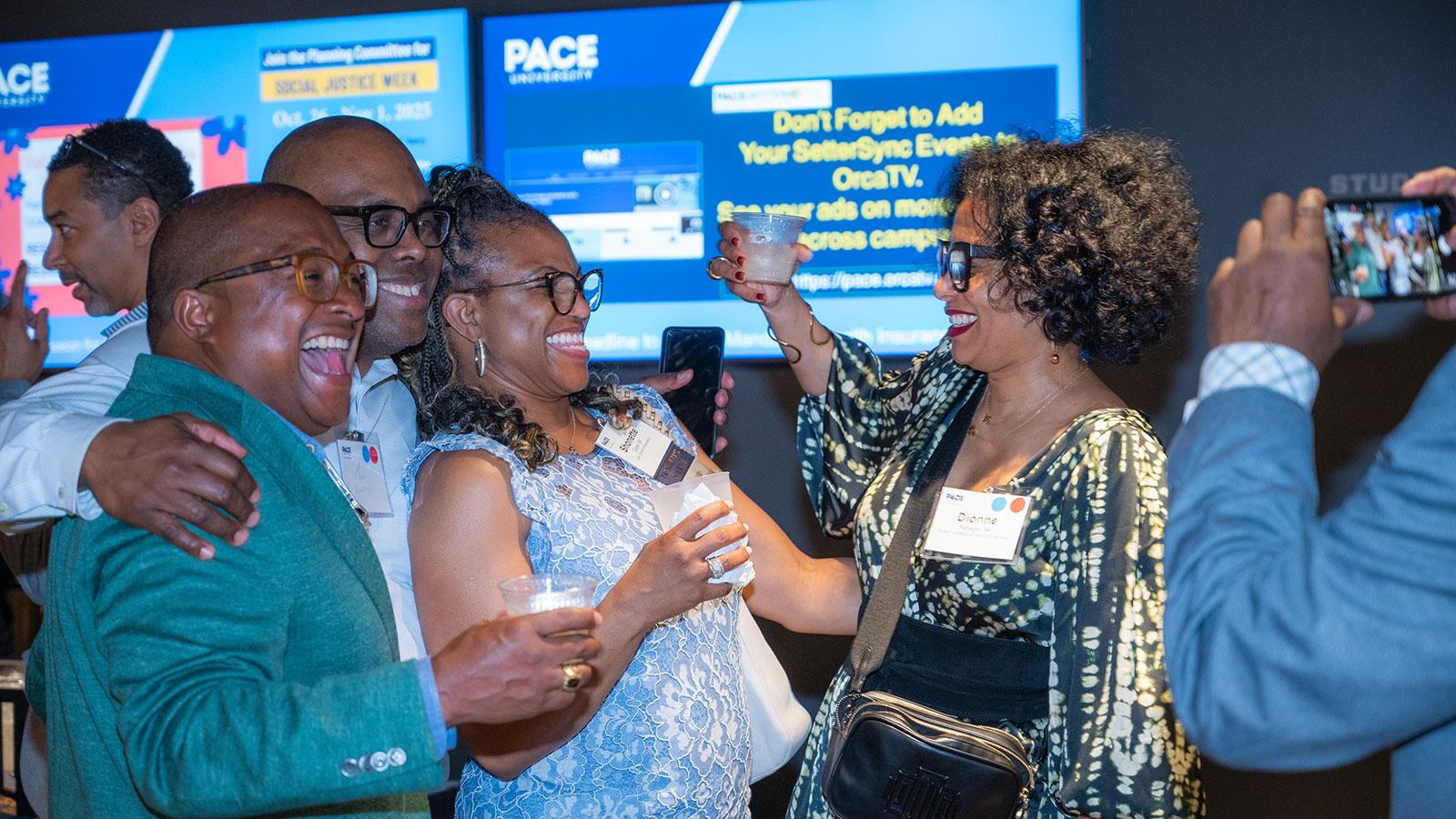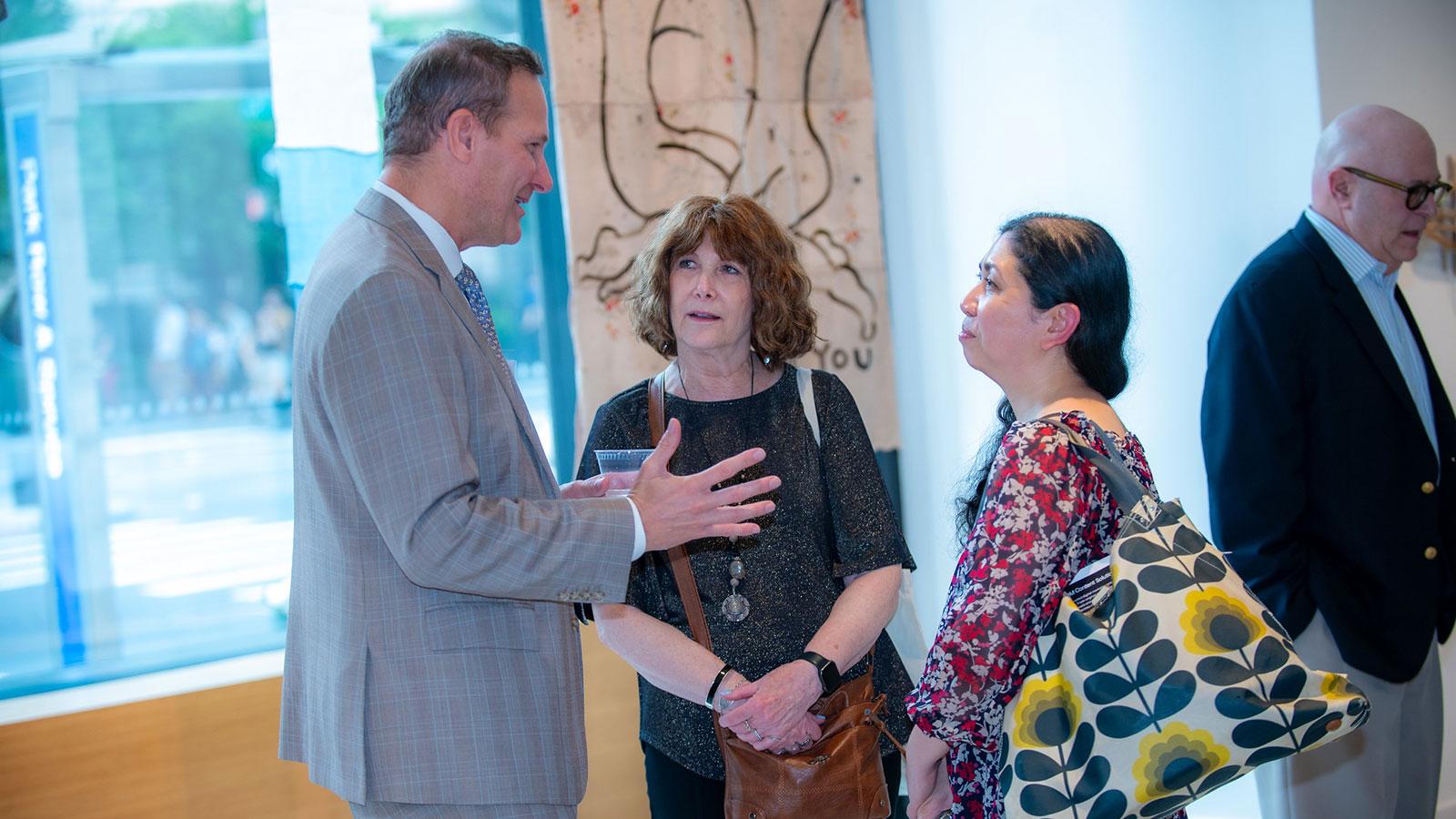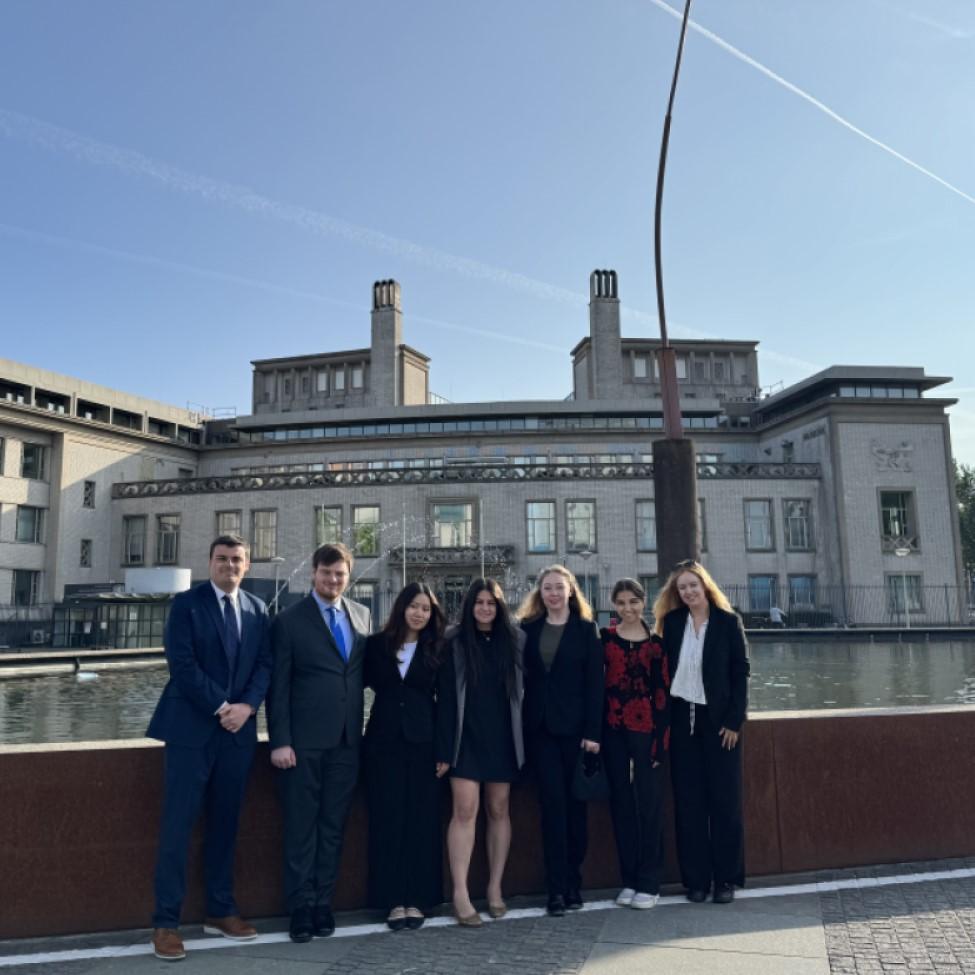
Pace Students Attend Games for Change Festival
When it comes to unwinding, gaming is often at the top of the list of go-to methods–but for Pace students, especially Seidenberg technology students, it’s a lifestyle. When a group of gaming and computer science students attended the Games for Change Festival, there was plenty to get excited about.
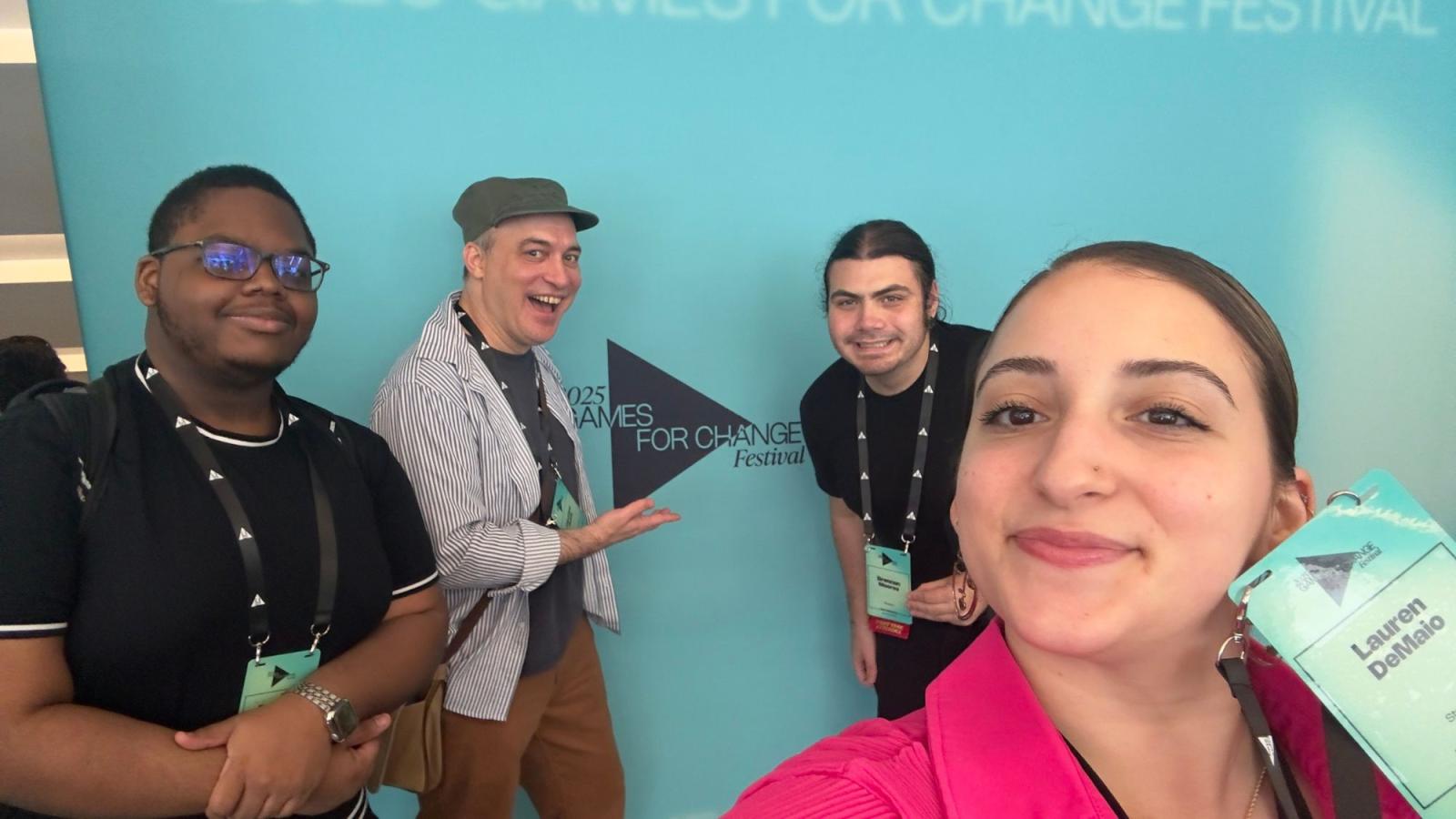
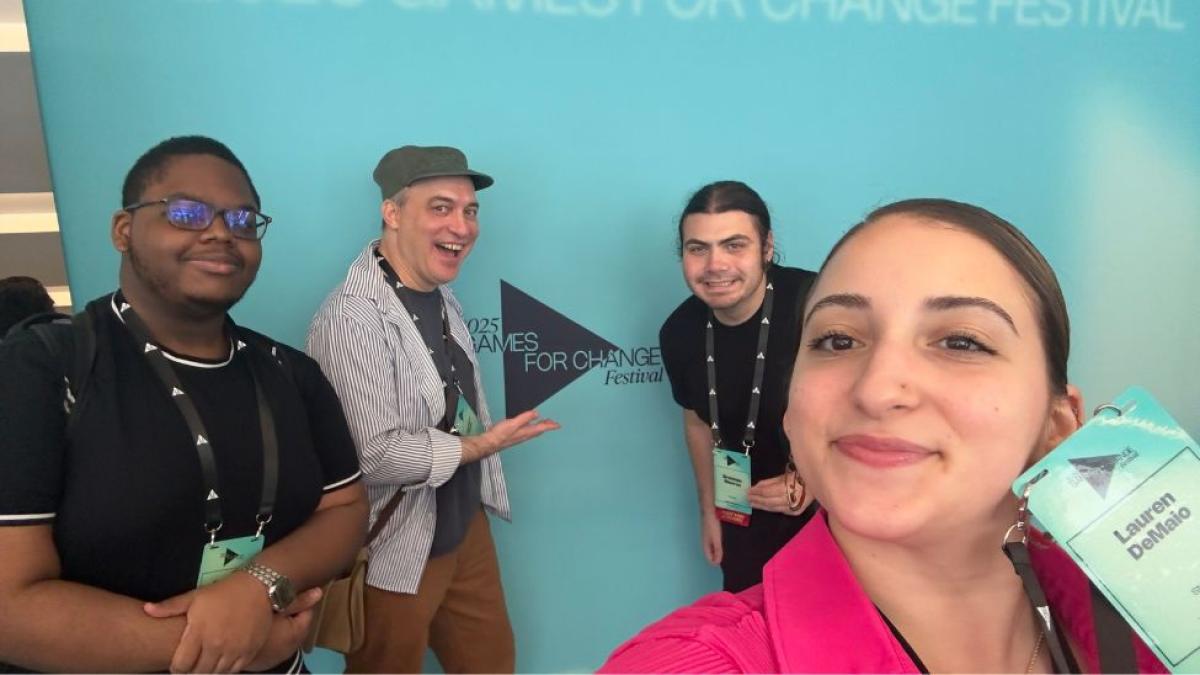
When it comes to unwinding, gaming is often at the top of the list of go-to methods–but for Pace students, especially Seidenberg technology students, it’s a lifestyle.
Finding ways to power up the impact of gaming on wellbeing has enduring appeal, so when a group of gaming and computer science students attended the Games for Change Festival, held at The New School in NYC, there was plenty to get excited about.
The festival was packed with high profile speakers, including Allison Matthews, Head of Minecraft Education at Microsoft; Deepak Chopra, prolific wellness and spirituality author and founder of Cyberhuman.ai; and Eric Monacelli, Executive Producer at Marvel Games.
"Games for Change was an insightful experience showcasing the connection between Game Development and social impact,” said Brennan Moore, a BA in Computer Science student.
It was empowering to connect with others who believe in this medium for a better future.
Seidenberg students Lauren DeMaio, Kerisa Williams, Donovan Lane, and Brennan Moores represented Pace University alongside Professor Carmine Guida, program director of Pace University’s BS in Game Development program.
The sessions covered a variety of topics, including bringing mindfulness and wellbeing into games, leveling up mental health, how games are used to improve education and career outcomes, and the ways in which GenAI is being used to create new ways to play.
Attending conferences is a powerful part of the student experience at Pace University. Seidenberg students frequently attend national and international conferences, including research-based conferences as well as events like the Grace Hopper Celebration for Women in Technology, AfroTech, DefCon, and more.
"Bringing students to a conference was an excellent opportunity for them to get inspired and do some networking with different game companies,” said Professor Guida.
Conferences offer the opportunity to expand horizons and bring new learning into your craft–how these students will incorporate wellbeing concepts into their games will form part of a new movement in mental health tech.
Pace Haub Law Trial Advocacy Team Competes in Prestigious ICC Moot Court Competition in The Hague
The Elisabeth Haub School of Law at Pace University’s Trial Advocacy Team recently competed in the prestigious IBA International Criminal Court Moot Court Competition (IBA ICCMCC) held in the Hague.
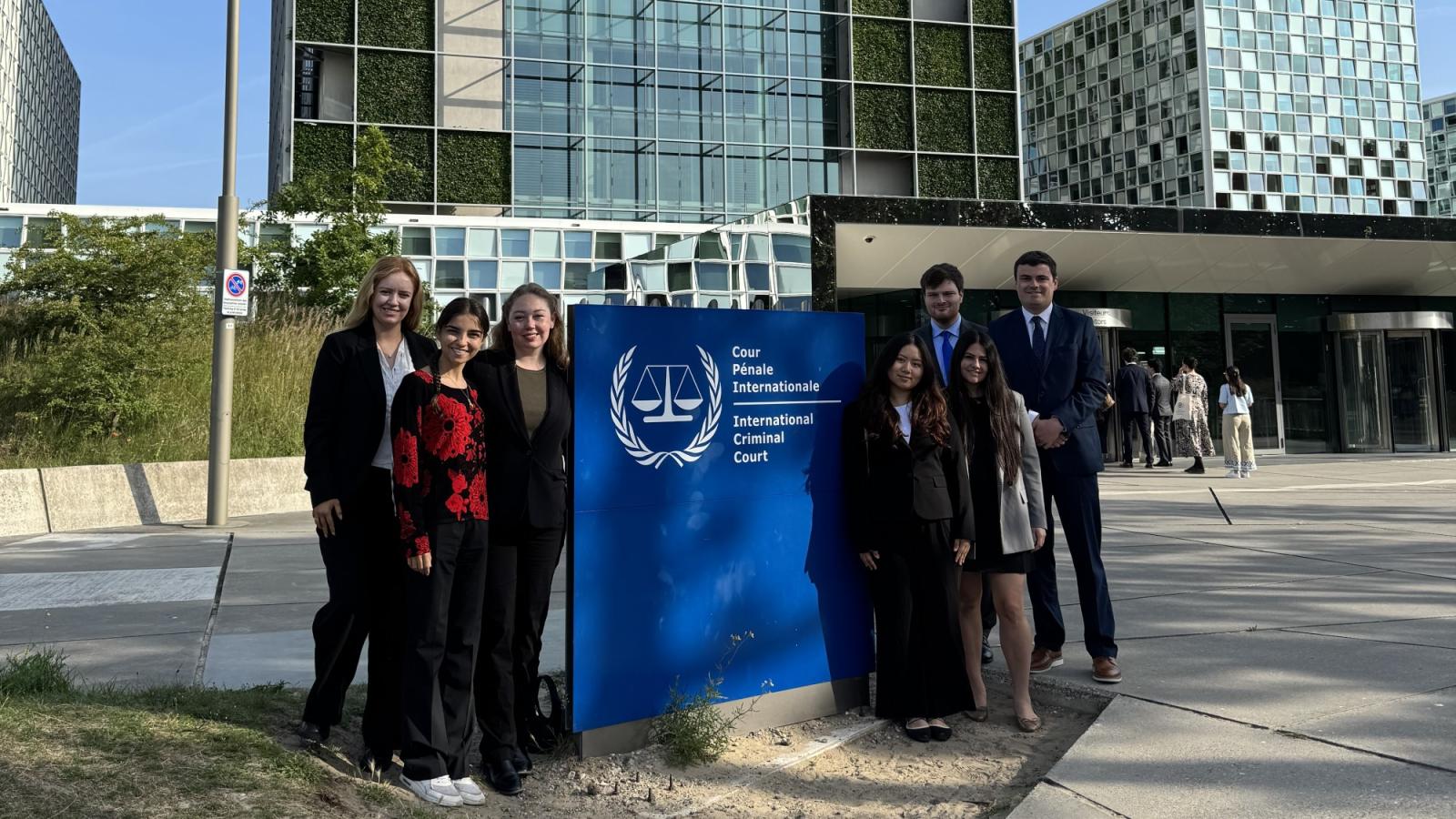
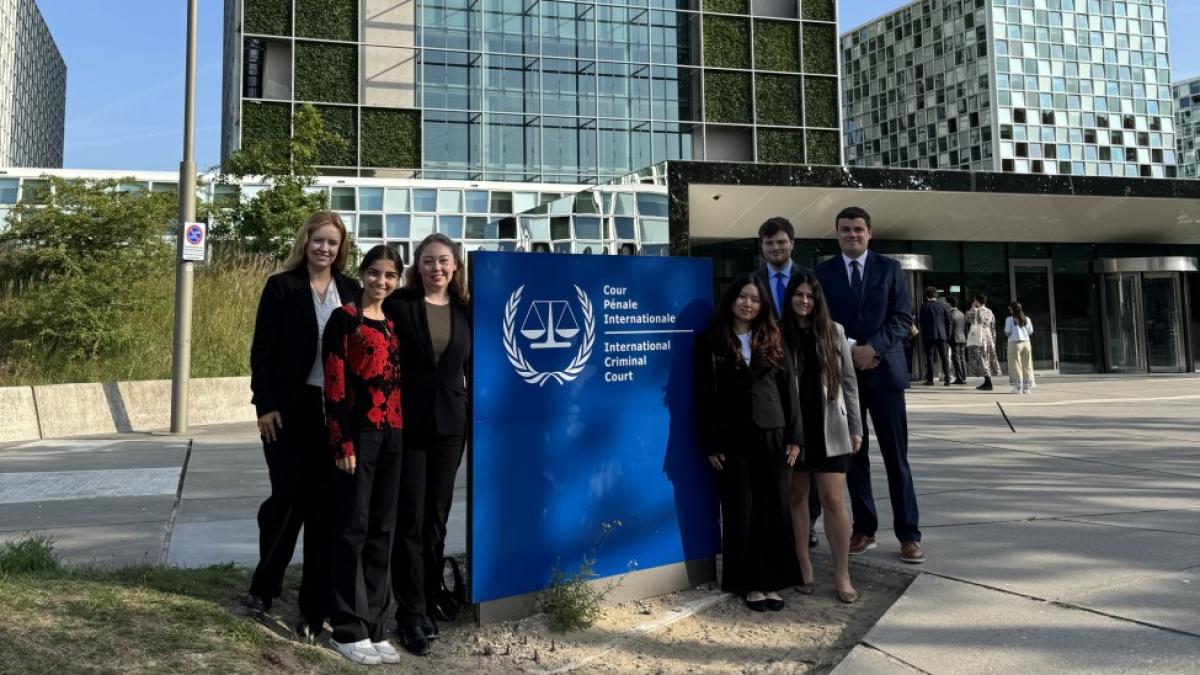
The Elisabeth Haub School of Law at Pace University’s Trial Advocacy Team recently competed in the prestigious IBA International Criminal Court Moot Court Competition (IBA ICCMCC) held in the Hague. This remarkable accomplishment comes after the team qualified as a finalist in March during the 2025 Regional Round for the Americas and the Caribbean of the International Criminal Court Moot Court Competition (ICC Moot). The impressive Law School Trial Advocacy Team included Priscilla Holloway, Sophie Bacas, Tenzin Lhamo, Victoria Perretti, and Jacob Cannon; the team was coached by Brad Gorson ‘13, Stephanie Areford ‘24, and David Anderson.
Pace Haub Law enjoys a strong history with the ICC Moot as it was first organized in 2004 by Professors Emeritus Gayl S. Westerman and Matthew E. Brotmann. At the time, the moot was the world’s only moot court competition based on the law and procedures of the newly created ICC, the first permanent international tribunal dedicated to the prosecution of international criminal offenses. Since 2004, the International Criminal Court (ICC) has grown, and the Competition has grown with it. In 2014, Pace Haub Law partnered with the International Criminal Court and the Grotius Centre for International Legal Studies, Leiden University to create a global competition, the ICC Moot Court Competition, which is held annually in The Hague, Netherlands, with the final round judged at the ICC itself by ICC judges and legal officers. More recently, in 2017, the ICC Moot started its collaboration with the International Bar Association (IBA), and in 2020 the IBA became a name partner in the Competition. Each year, the qualifying rounds are hosted on the Pace Haub Law campus. This year marks the first time in 12 years that the Law School sent a team to continue to compete in the Competition in the Hague. Pace Haub Law Professor Alexander K.A. Greenawalt serves as faculty director of the Moot.

“This was an incredible opportunity for our Law School and its student advocates,” said Coach Brad Gorson ’13. “This year’s Trial Advocacy Team who traveled to the Hague to compete dedicated months of hard work and preparation in advance of the Competition. On behalf of all of the coaches, we are beyond proud of the work our team put in to get to the Hague and showcase the strength of the Pace Haub Law Advocacy Program.” The Elisabeth Haub School of Law at Pace University is home to a top ranked trial advocacy program. In 2025, it was ranked #19 in the nation by U.S. News & World Report.
“The Competition was an incredible experience,” shared recent graduate Priscilla Holloway, who competed on the team as a 3L. “We were brought face-to-face with some of the world’s most talented law student advocates. We argued against teams from Cambodia, Kenya, Ghana, China, Nigeria, India, Bangladesh, and the Philippines, each bringing their own legal traditions and perspectives to the courtroom. It was a transformative experience.”
The experience taught us that international criminal law isn't just about abstract legal principles—it's about grappling with humanity's worst impulses while striving to build systems of accountability that can transcend national boundaries.
Priscilla continued, “What struck me most about the competition was how it illustrated the real-world impact of these legal concepts. The experience taught us that international criminal law isn't just about abstract legal principles—it's about grappling with humanity's worst impulses while striving to build systems of accountability that can transcend national boundaries. Competing alongside students from around the world reinforced that despite our different backgrounds and legal systems, we shared a common commitment to the rule of law and the pursuit of justice on a global scale.” The ultimate winner of this year’s Competition was Singapore Management University.
“I am tremendously proud of both the students and coaches who placed highly in the ICC Moot Regional Round held on the Pace Haub Law campus which qualified the team to travel to compete in the premiere international competition held in The Hague,” Professor Louis Fasulo, Director of Advocacy Programs and Professor of Trial Practice. “Our advocacy program continues to soar to new heights every single year and this is another testament to that. Thanks to the dedication of our students, coaches, and law school, the limits of our program are endless.”
Press Release: Pace University Students Awarded Prestigious Gilman Scholarships to Study Abroad
Five Pace University students have been awarded the Benjamin A. Gilman International Scholarship by the U.S. Department of State to study or intern abroad during the 2025–2026 academic year. They join a competitive national cohort of 3,500 recipients selected from over 17,000 applicants.
Five Pace students among 3,500 recipients nationwide recognized by the U.S. Department of State
Five Pace University students have been awarded the Benjamin A. Gilman International Scholarship by the U.S. Department of State to study or intern abroad during the 2025–2026 academic year. They join a competitive national cohort of 3,500 recipients selected from over 17,000 applicants.

The scholarship, established by Congress and administered by the U.S. Department of State’s Bureau of Educational and Cultural Affairs, is designed to support high-financial-need students in expanding their global engagement. Additionally, over 70 percent of recipients come from rural areas or small towns, and 55 percent are first-generation college students.
"Winning the Gilman Scholarship means everything to me as someone who works three jobs to be able to fulfill my dreams,” said Glerrys Flores Pacheco, who is studying acting abroad in Barcelona as part of the Sands International Performance Ensemble in Fall 2025. “Studying acting in Spain while collaborating with fellow artists is more than an opportunity, it's a step towards the life I’ve been working so hard to build since coming from Puerto Rico. This award brings me closer to turning my passion into a reality, and I’m beyond grateful."
Additional Gilman recipients from Pace include:
- Tageena Reserve, Computer Science, Hong Kong Baptist University, Honk Kong
- Mikayla Fischer, Directing, Sands International Performance Ensemble, Barcelona
- Andrea Machovec, Business Analytics, Richmond American University, London
These students represent a wide range of disciplines and colleges at Pace and will pursue international academic experiences throughout the upcoming year.
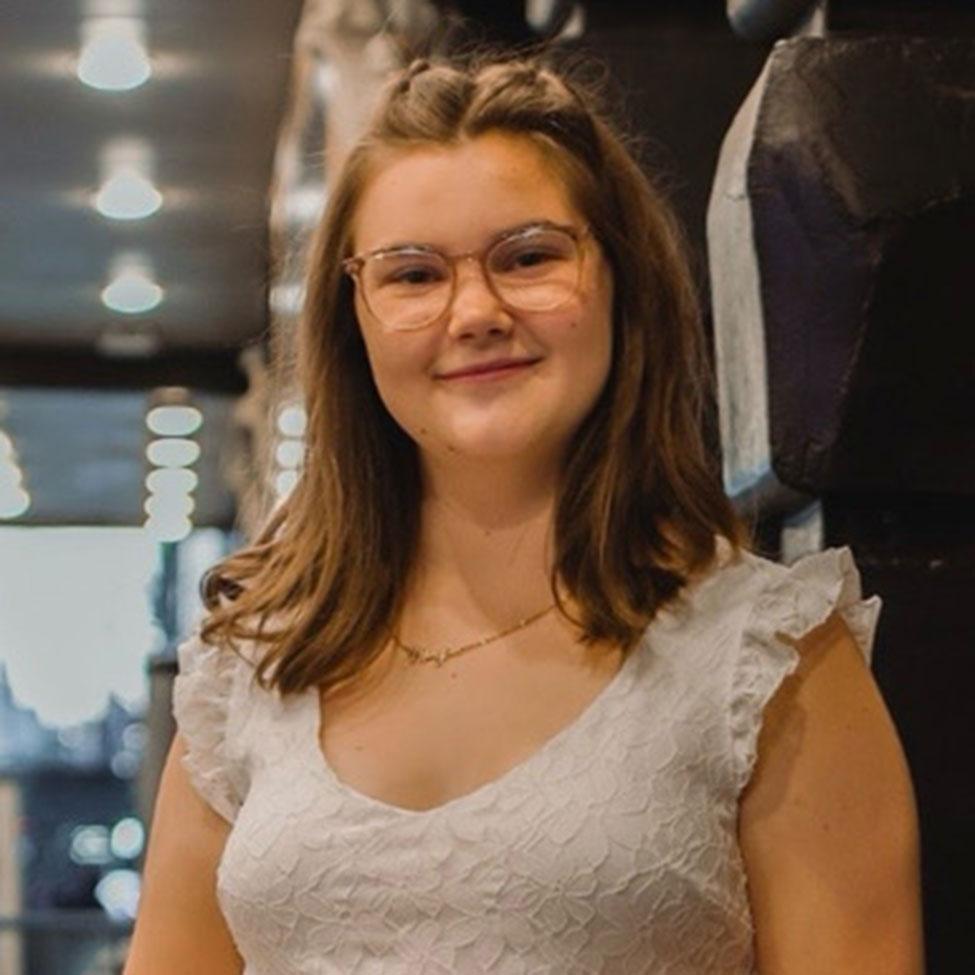
“As a sophomore at Pace University, I’m beyond thrilled and grateful to receive the Gilman Scholarship,” said Mikayla Fischer, who is studying abroad in Barcelona as part of the Sands International Performance Ensemble in Fall 2025 “This award is making it possible for me to study Theatre Directing in Sitges, Spain, a place full of artistic inspiration and cultural richness. Studying abroad has always been a dream of mine, and I’m so excited to grow as both a student and a storyteller through this incredible experience.”
Fischer’s opportunity is one example of how the Gilman Scholarship empowers students to pursue academic and artistic passions abroad, experiences that foster both personal and professional growth.
“The Gilman Scholarship is more than a financial award, it’s a gateway to global citizenship,” said Jonathan H. Hill, DPS, Interim Provost and Executive Vice President for Academic Affairs at Pace University. “We are incredibly proud of our students for earning this distinction. Their drive to engage with the world reflects Pace’s commitment to preparing students not only for meaningful careers but also for impactful lives. These experiences broaden their horizons, deepen their learning, and reinforce our role as a university of opportunity.”
Pace University hosts a vibrant international community, welcoming students from over 117 countries who collectively speak 98 languages. This global diversity enriches the academic environment and underscores the university's commitment to fostering cross-cultural understanding and global engagement. Through its Study Abroad program, Pace offers students the opportunity to study abroad in more than 30 countries, with over 75 approved semester and academic year programs.
The next Gilman application cycle will open in August 2025. Students interested in exploring scholarships for studying abroad are encouraged to connect with the Pace Study Abroad by email.
About Pace University
Since 1906, Pace University has been transforming the lives of its diverse students—academically, professionally, and socioeconomically. With campuses in New York City and Westchester County, Pace offers bachelor, master, and doctoral degree programs to 13,600 students in its College of Health Professions, Dyson College of Arts and Sciences, Elisabeth Haub School of Law, Lubin School of Business, Sands College of Performing Arts, School of Education, and Seidenberg School of Computer Science and Information Systems.
About the Gilman International Scholarship Program
The U.S. Department of State’s Benjamin A. Gilman International Scholarship Program (Gilman Program) supports students of limited financial means to study or intern abroad, providing them with skills critical to our national security and economic prosperity. The Gilman Program is a competitive, merit-based scholarship. To be eligible for the Gilman Program, applicants must be receiving a Federal Pell Grant during the time of application or provide proof that they will be receiving a Pell Grant during the term of their study abroad program or internship. The Institute of International Education has administered the program since its inception in 2001.
Seidenberg Class of 2025 Student Awards
As the Spring 2025 semester wrapped up, students, families, faculty, and staff of Pace University’s Seidenberg School of Computer Science and Information Systems gathered on our NYC and Pleasantville campuses to recognize the Class of 2025 award recipients at our annual Awards Ceremonies.
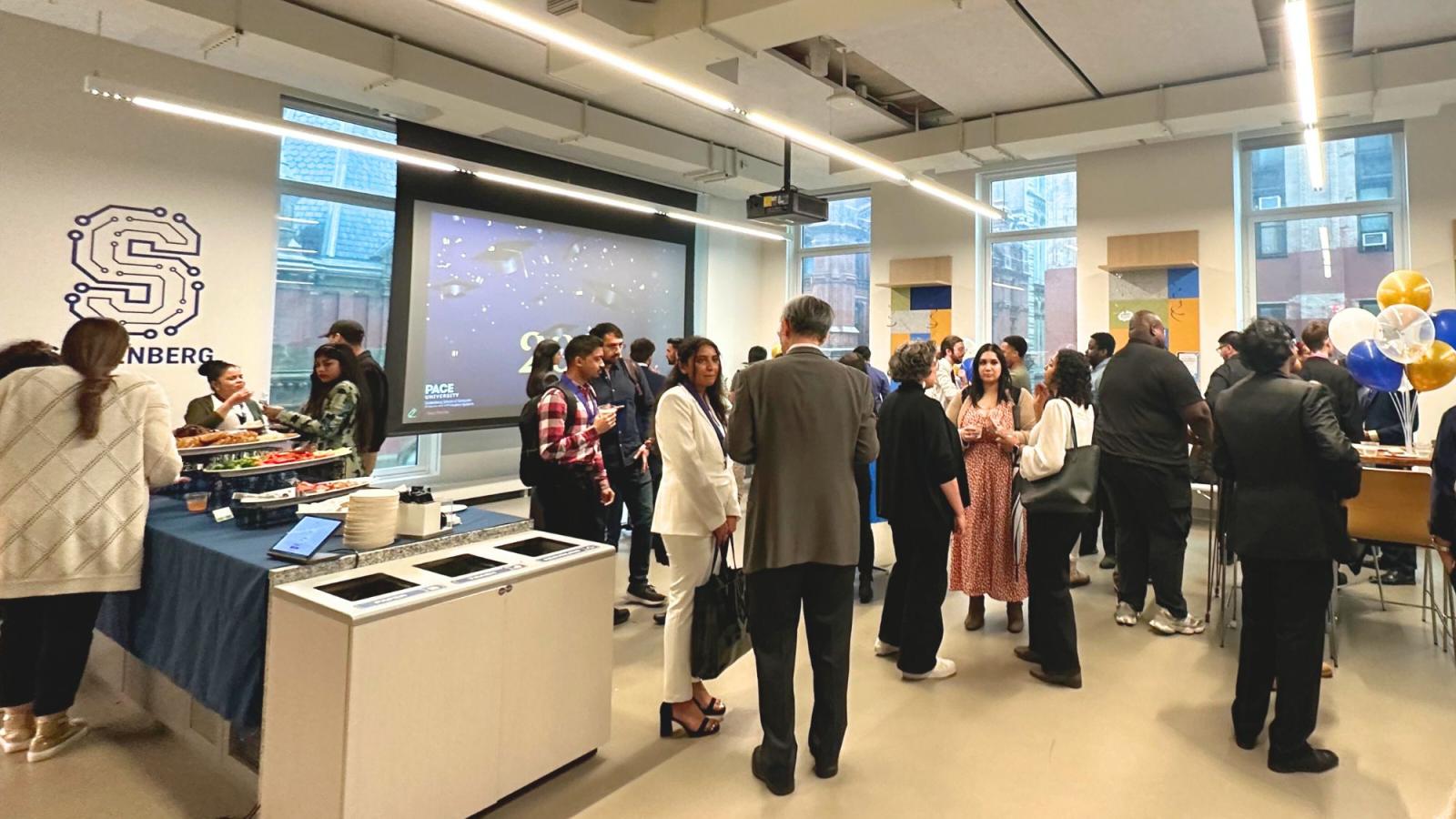
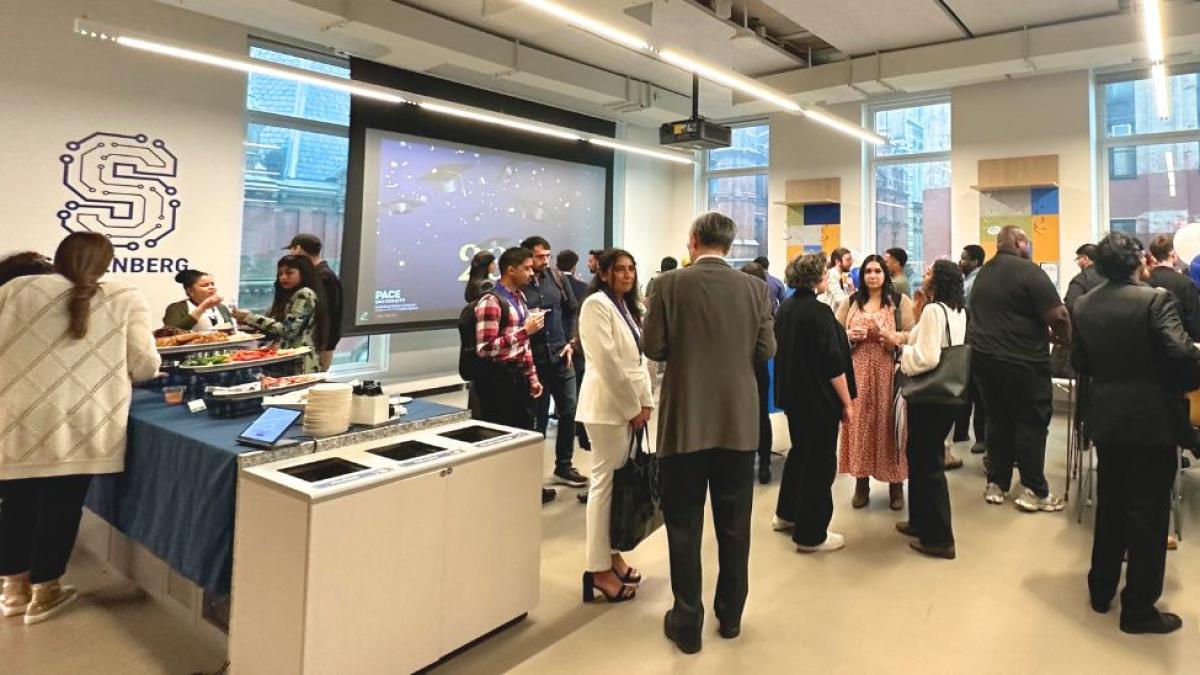
As the Spring 2025 semester wrapped up, students, families, faculty, and staff of Pace University’s Seidenberg School of Computer Science and Information Systems gathered on our NYC and Pleasantville campuses to recognize the Class of 2025 award recipients at our annual Awards Ceremonies.
Below is the full list of honorees from this year’s graduating class. Congratulations to you all—we are proud to celebrate your outstanding achievements!
Doctoral Awards
- Outstanding Student of the Year: Lisa Ellrodt
Graduate Awards
- Outstanding Student of the Year: Roshan Niranjan Kalpavruksha, Rohan Niranjan Kalpavruksha
- Computer Science Departmental Award: Ross Richard Carvalho, Kaiyin Chen, Yining Chen, Tarjanee Desai, Sharon Dsouza, Jenisha Gajera, Xinyu Guan, Rishita Gupta, Sivasankaran Kaleeswaran, Bala Selvaraj, Murali Kummari, Uday Reddy, Zaid Mohammad, Sushanth Nandeti, Jill Pathak, Dylan Pereira, Damin Shah, Amulya Thatha, Sarat Vanam
- Francis Marchese Software Development and Engineering Award: Parimal Borkar
- Cybersecurity Scholar Award: Hari Chodapuneedi, Samantha Henry, Linda Laryea, Ceasar Lugo, Austin Powlette, Matthew Shine, Arshdeep Singh
- Data Science Scholar Award: Esha Bawaskar, Amey Borkar, Julia Cardillo, Tejomay Kapadia, Aravind Yeddula
- Information Systems Scholar Award: Akshay Dhakan, Sravani Kola, Nishad Kolhe, Vaishali Laveti, Impanaa Lokesh, Durga Madhiraju Shashank Mysore, Viraj Rasal
- Human Centered Design Scholar Award: Tejaswini Khedkar, Angelique Perrin, Rosa Ramos, Jason Truong, Lalita Wongsakvanich
School Awards, Graduate
- Jean Coppola Award for Excellence in Service-Learning: Fabian Hiller
- Susan M. Merritt Computing Award for Academic Excellence: Riya Golani
- Seidenberg Civic Engagement Award: Ross Carvalho
- Graduate Alumni Achievement Award: Victor Zapata
- Seidenberg Leadership in Action Award: Tejomay Kapadia
- Career Services Award: Jill Pathak
Undergraduate Awards (Pleasantville)
- Scholastic Achievement Award: Isabella Coraci, Anthony Oramas
- Computer Science Departmental Award: Vincent Ret
- Information Technology Departmental Award: Charles Ten
Undergraduate Awards (NYC)
- Scholastic Achievement Award: Alyssa Lahaise
- Computer Science Departmental Award: Evan Frazier
- Information Technology Departmental Award: Huy Nguyen
School Awards, Undergraduate (Pleasantville)
- Jean Coppola Award for Excellence in Service-Learning Research: Ashley Peleg, Andrew Iadevaia
- Susan M. Merritt Computing Award for Academic Excellence: Madelyn Zambrano
- Seidenberg Civic Engagement Award: Ariana Contes
- Alumni Achievement Award: Thomas Karintholil
- Seidenberg Scholars: Victor Lima, Madelyn Zambrano
- Blue CoLab Innovation Award: Victor Lima
- Career Services Award: Meryl Mizell
School Awards, Undergraduate (NYC)
- Jean Coppola Award for Excellence in Service-Learning Research: Justin Boudreau, Nico Middleton
- Susan M. Merritt Computing Award for Academic Excellence: Nicole Romano, Fatima Bensassi, Audrey Louie
- Seidenberg Civic Engagement Award: Julia Tretyakov, Sachin Archer
- Seidenberg Involvement Award: Andrew Dinspechin, Junior Jean
- Seidenberg Scholars: Justin Boudreau, Amogh Iyer, Alyssa Lahaise, Solace-Simone Lattery, Paul Mash, Nico Middleton
- Career Services Award: Maisha Rauzat
Latin Honors (Pleasantville)
- Summa Cum Laude: Aaron Amalraj, Ariana Contes, Isabella Coraci, Anthony Oramas, Ashley Peleg, Vincent Ret, Madelyn Zambrano
- Magna Cum Laude: Dave Bileri, Ariel Cargill, Thomas Karintholil, Shahid Khan, Victor Lima, Meryl Mizell, Justin O'Neill, Mauricio Rabanales Cruz, Andres Rodriguez, Sebastian Roman
- Cum Laude: Gerardo Basso, Conor Jonassen, Dain Nishad, Kristan Panton
- With Distinction: Charlie Ten, Kelvin Rodriguez De Jesus
Latin Honors (NYC)
- Summa Cum Laude: Shalini Basu, Evan Frazier, Carson M Glines, Vasilios Koumbaros, Gregory Krupoff, Alyssa Lahaise, Kenny Luong, Audrey Louie, Huy Nguyen, Maisha Rauzat, Dominick Sacchetti, Tyler Stafford
- Magna Cum Laude: Joel Avendano Ascencio, Fatimazahra Bensassi, Justin Boudreau, Saatvik Chaudhari, Thomas Dinopoulos, Nathan Feng, Joseph Hilditch, Amer Issa, Solomon Khalili, Kevin Liu, Eleanor S Nealon, Russell C Ng, Nicole Romano, Ayden Rodriguez, Younes A Roumila, Pride Yin
- Cum Laude: Sahim Ahmed, Aleenah Alam, Sachin Archer, Patrick Casseus, Jason Forrisi, Gabriel Fanshteyn, Dante Hurr, Maleehah Jaaber, Nico Middleton, David Pinheiro Rosa, Paul Mash, Solace-Simone Lattery, Wilson Lu, Aaliyah Singh, Yared Yehualashet, Julia Tretyakov, Myron Zun Hao Weng
- With Distinction: John Bambury, Brandon Barrett, Andre D'sa
Aligning for Impact: Pace Professor Co-Authors Book on Institutional Collaboration
Seidenberg School of Computer Science and Information Systems Professor Namchul Shin has co-authored a new book published by Oxford University Press that offers a timely, forward-looking exploration of institutional collaboration in the 21st century.
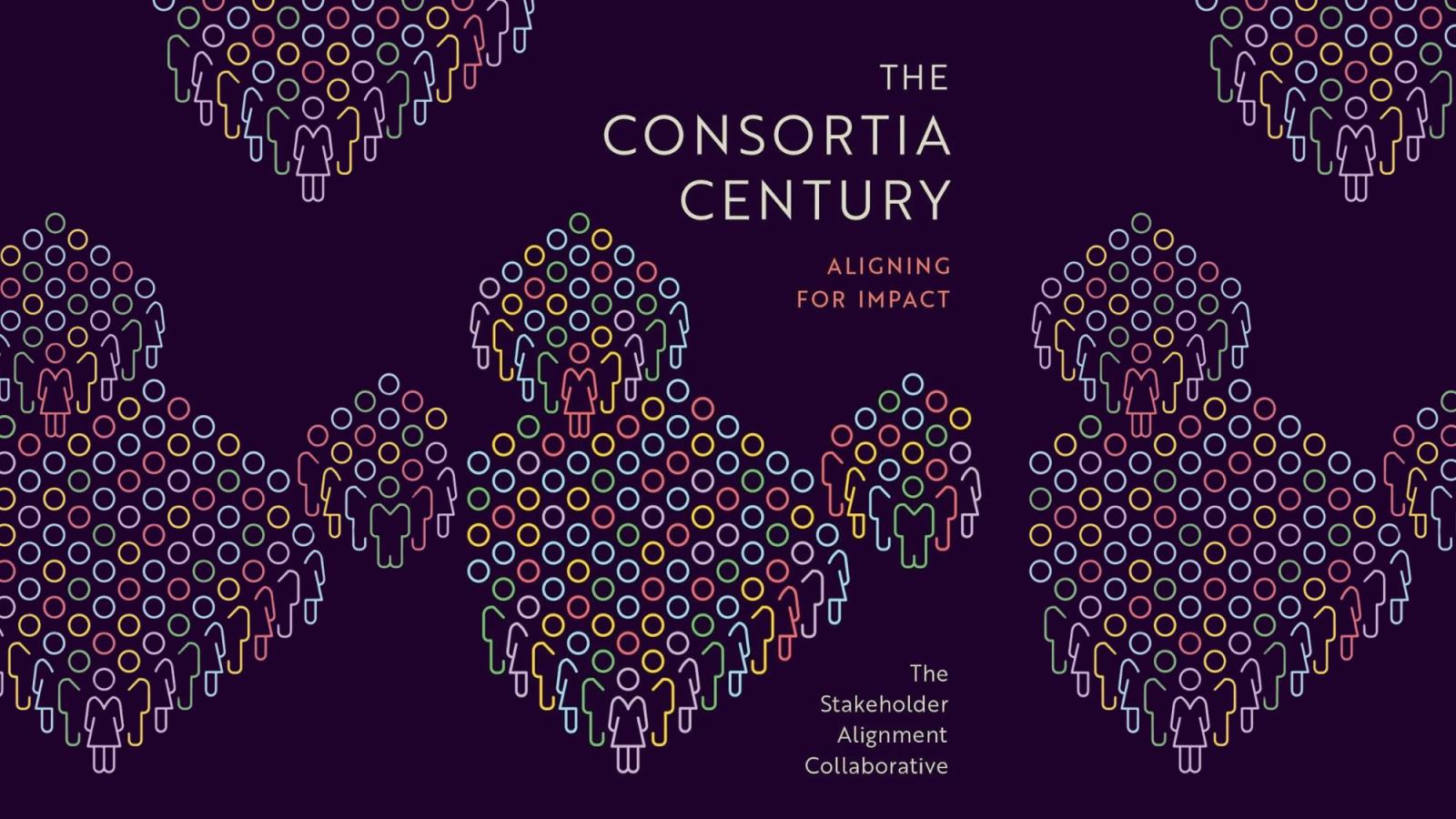
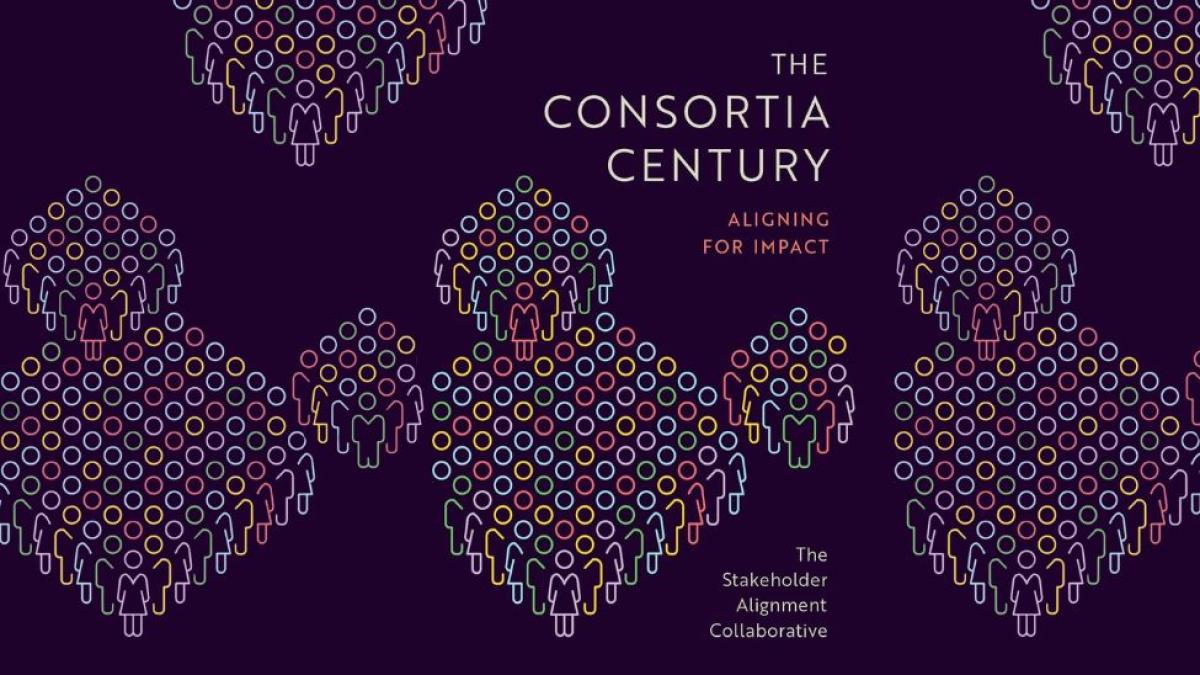
Seidenberg School of Computer Science and Information Systems Professor Namchul Shin has co-authored a new book published by Oxford University Press that offers a timely, forward-looking exploration of institutional collaboration in the 21st century.
The Consortia Century: Aligning for Impact, released in 2025, is the work of the Stakeholder Alignment Collaborative, a multidisciplinary group of 30 scholars, policymakers, and practitioners. Among them is Shin, Professor of Information Systems at Pace University’s Seidenberg school whose research and teaching focus on innovation, information systems, sustainability, and the organizational dynamics that shape technology-driven transformation.
Shin, his expertise in innovation, IT value, and environmental sustainability to the project. His recent research includes using large language models to assess biodiversity reporting in the coal mining industry, presented at conferences in Seoul, South Korea. This work exemplifies his commitment to leveraging technology for global sustainability efforts.
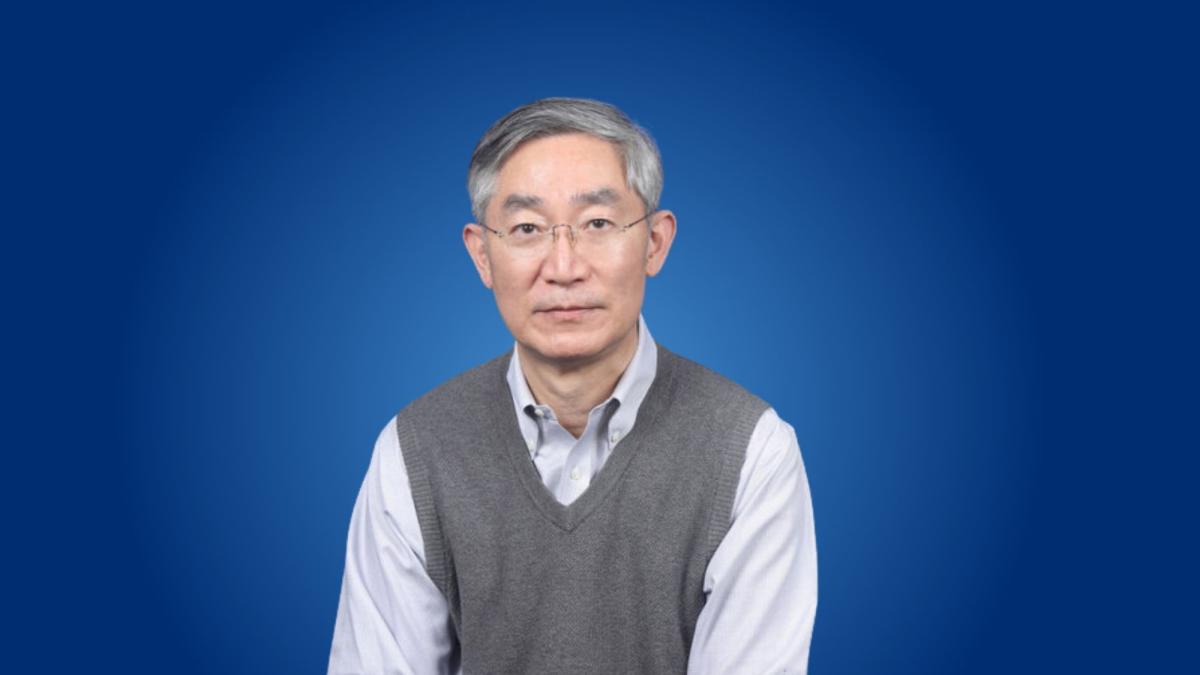
The book posits that consortia—multi-stakeholder alliances—will be the defining institutional form of the 21st century, capable of tackling issues too large for any single organization to solve alone. It offers real-world case studies and a framework for achieving lateral alignment across sectors, collective action beyond traditional top-down or bottom-up models. The authors made their point by using diverse case studies spanning biomedicine, social work, labor relations, video games, science, and higher education, among additional sectors, domains, and ecosystems.
With The Consortia Century, Shin and his co-authors provide both a conceptual foundation and practical guidance for fostering institutional collaboration, offering a roadmap for organizations seeking to align diverse stakeholders in pursuit of shared goals.
2025 Rankings Roundup
Pace is a university on the rise, riding a wave of forward momentum that is transforming the experiences of our students, setting new standards of excellence and innovation, and expanding our impact in communities across the globe. That success is earning national recognition—in rankings, in distinctions of excellence, and in the extraordinary achievements of our alumni across industries and disciplines.
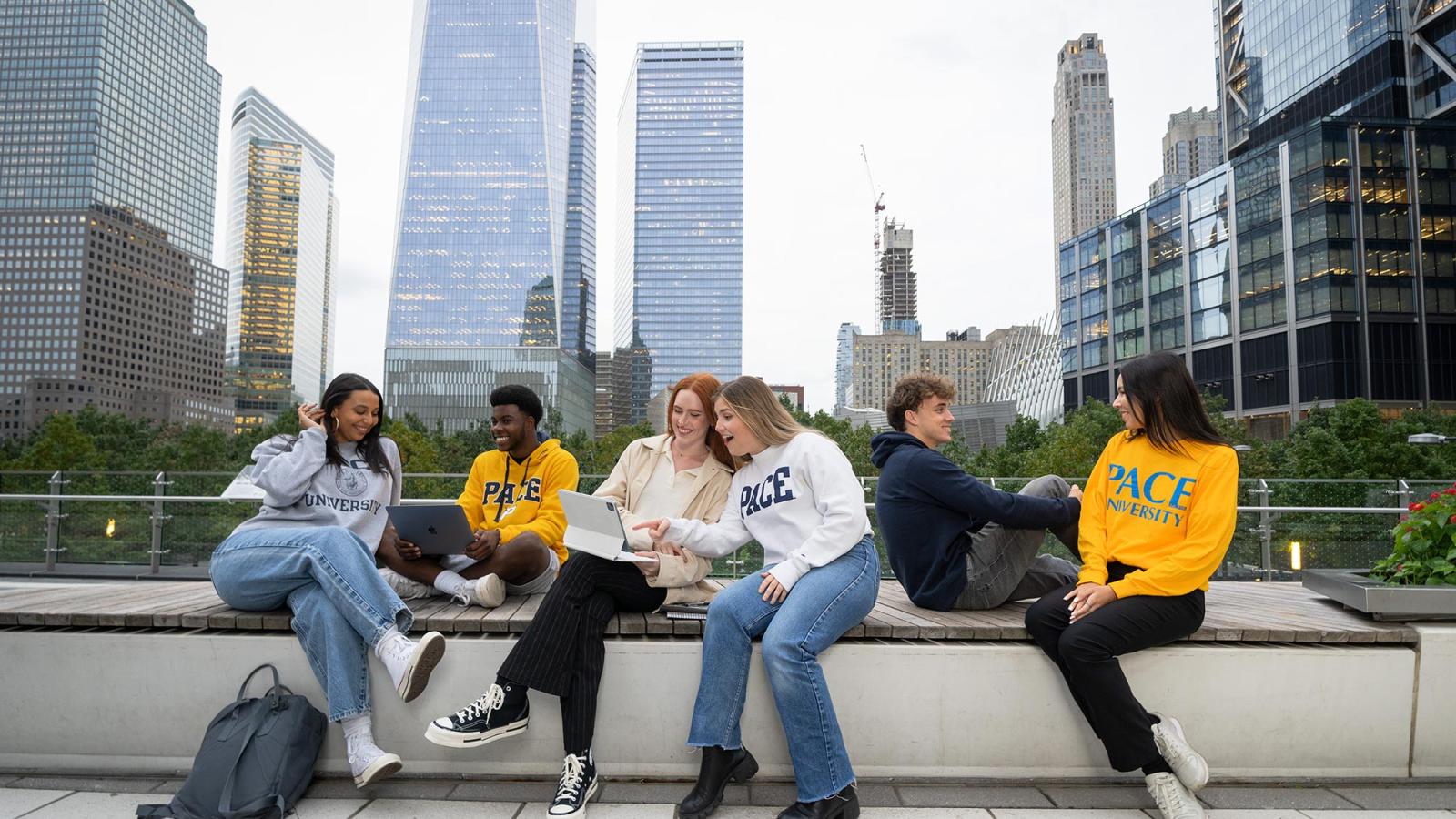
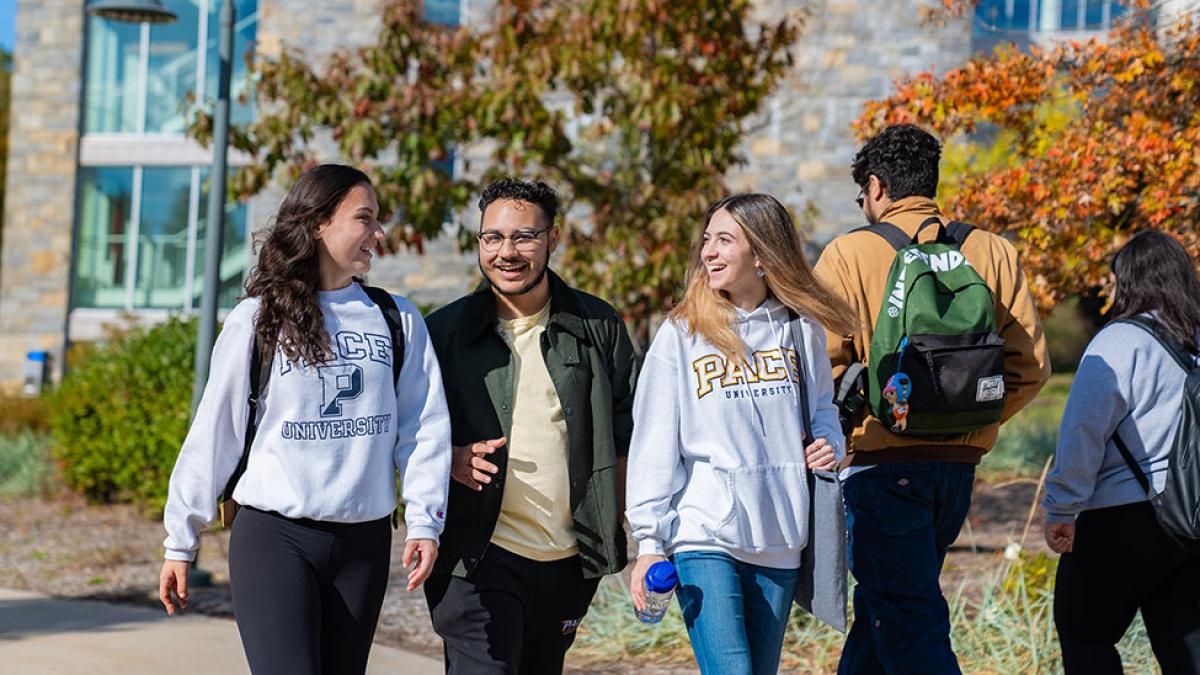
Numbers Don't Lie...
Pace is a university on the rise, riding a wave of forward momentum that is transforming the experiences of our students, setting new standards of excellence and innovation, and expanding our impact in communities across the globe.
That success is earning national recognition—in rankings, in distinctions of excellence, and in the extraordinary achievements of our alumni across industries and disciplines.
The proof is in the numbers. And those numbers tell the story of a university that is graduating the next generation of leaders and changemakers who are prepared to make a lasting difference in the world.
Career Outcomes
Pace is launching students into careers of impact and purpose.
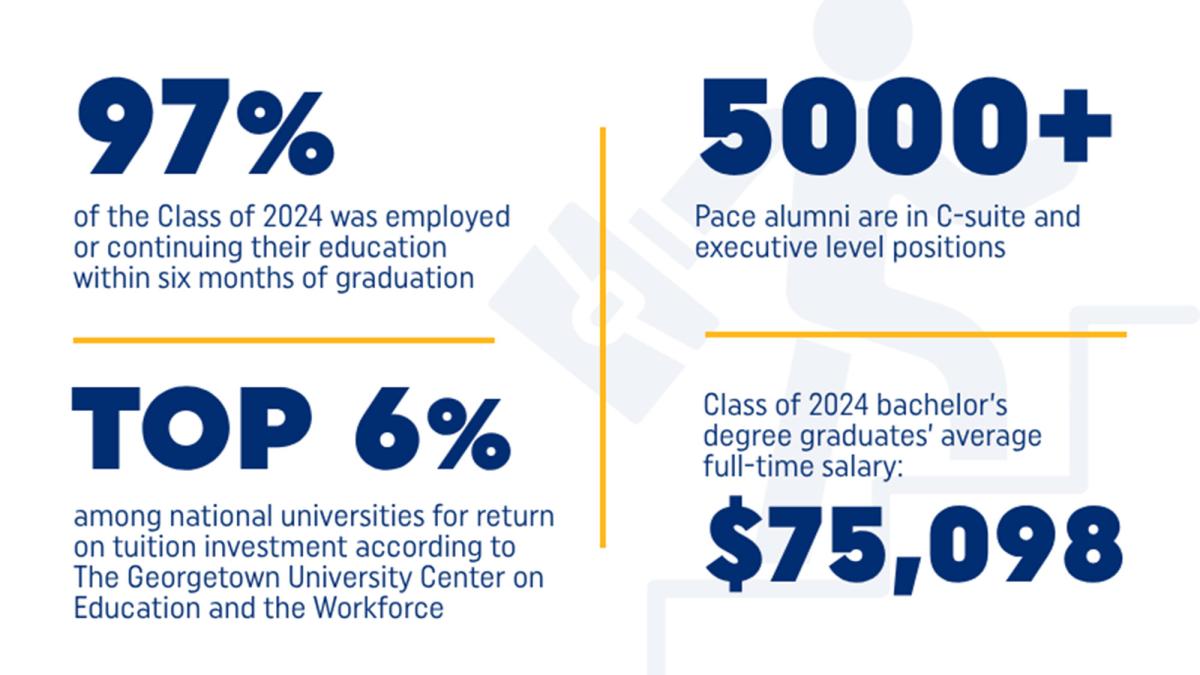
Program Excellence
Pace is building programs that blaze new trails.
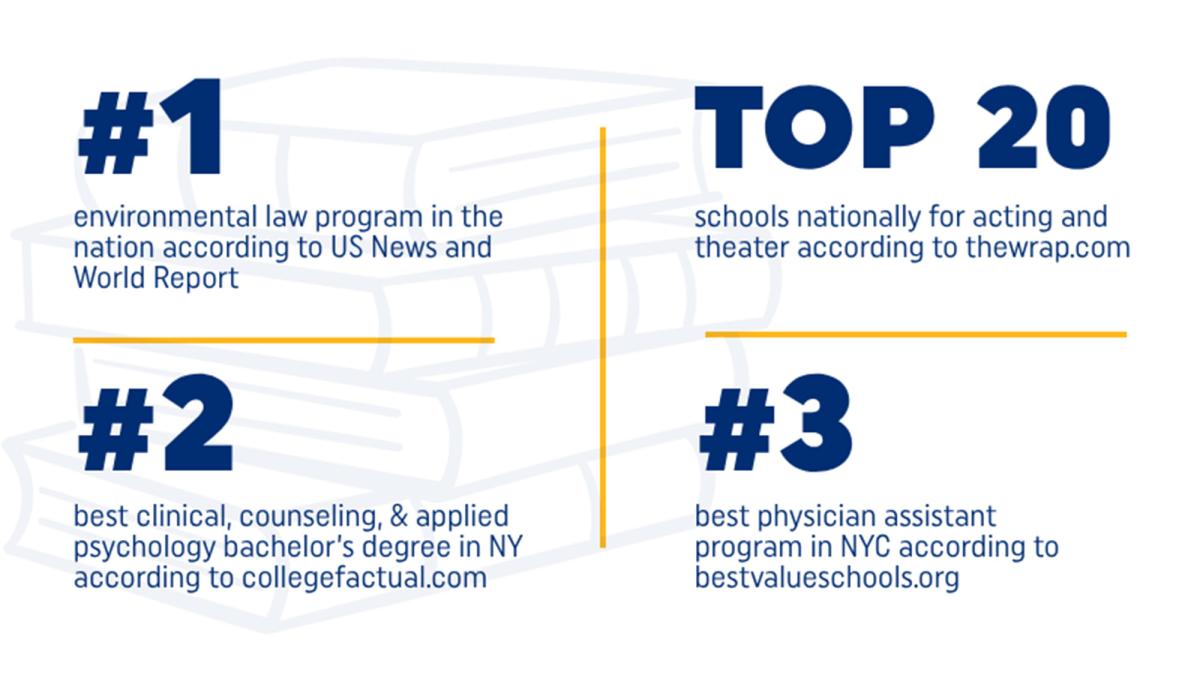
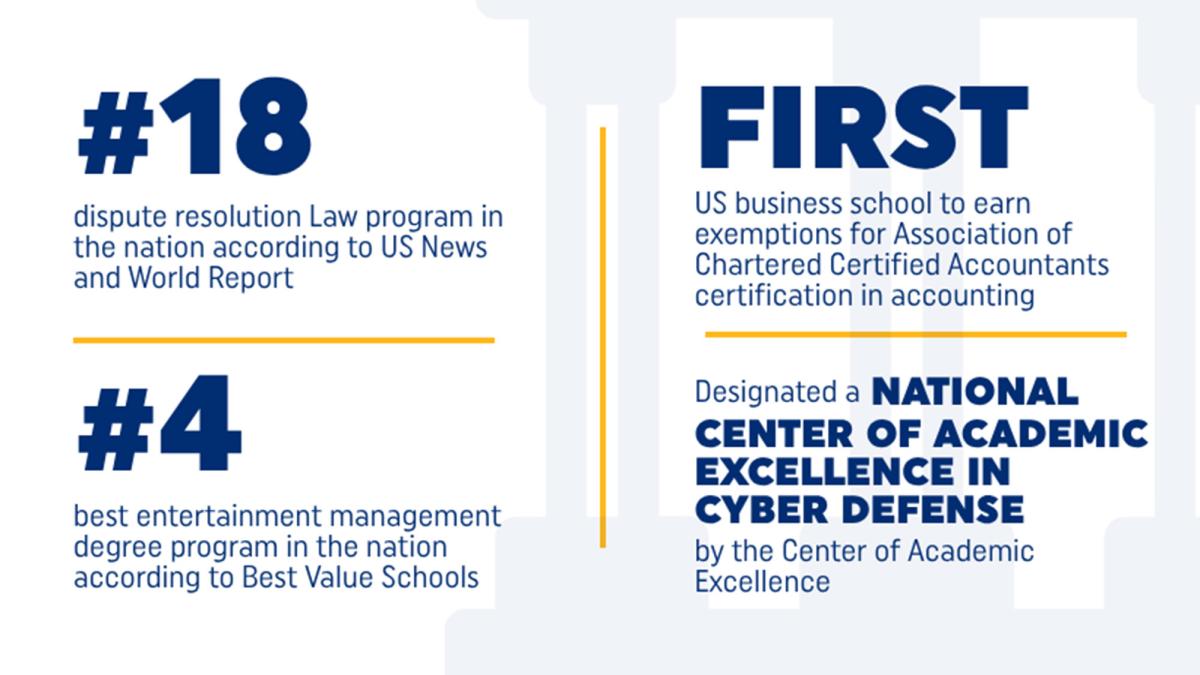
Accelerating Student Achievement
Pace is opening the doors of opportunity and achievement.
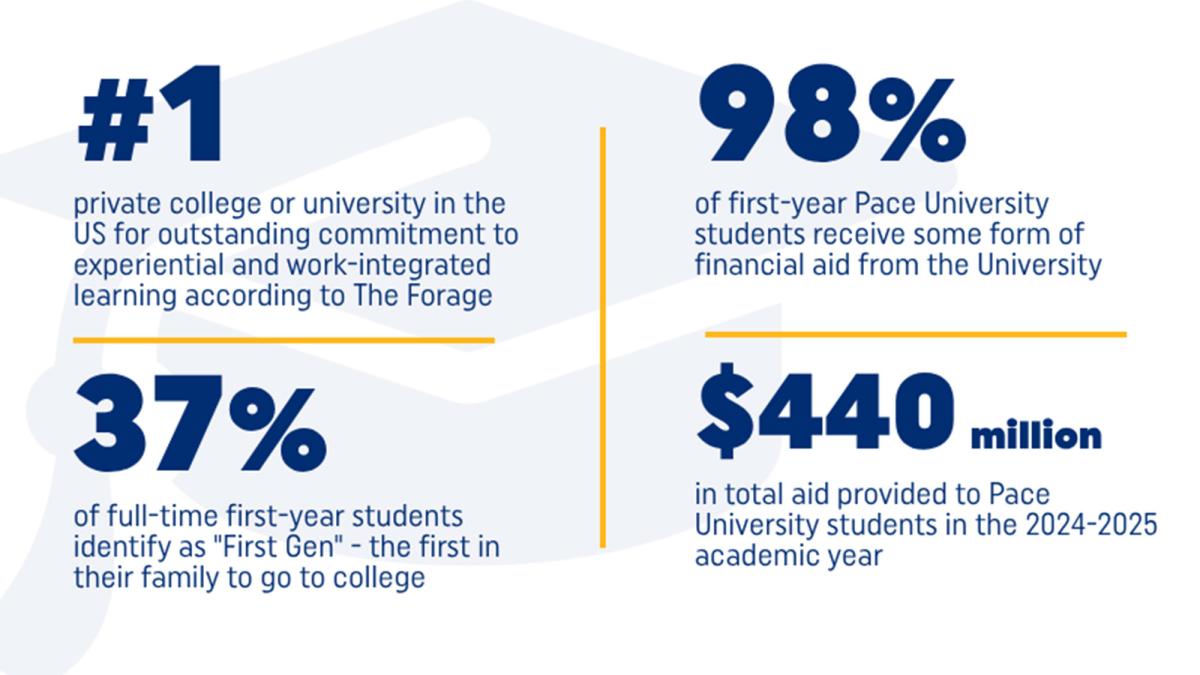
Maintaining Momentum
These numbers are just a glimpse of the countless ways that Pace is elevating excellence—in the achievements of our students and alumni, in the strength of our programs, and in the difference we make in our communities.
The work continues, and our commitment to the Pace mission is as strong as it's ever been.
There's so much more to share about the ways our University community is changing the world. For the latest on the extraordinary things happening at Pace, visit Pace Now.
Pace Haub Law Cohosts Roundtable Bringing Together Scholars to Explore Women, Gender, and Sexuality
On June 16, 2025, the Elisabeth Haub School of Law at Pace University and Albany Law School cohosted a Feminist Legal Studies Roundtable at the Pace University campus in Lower Manhattan.
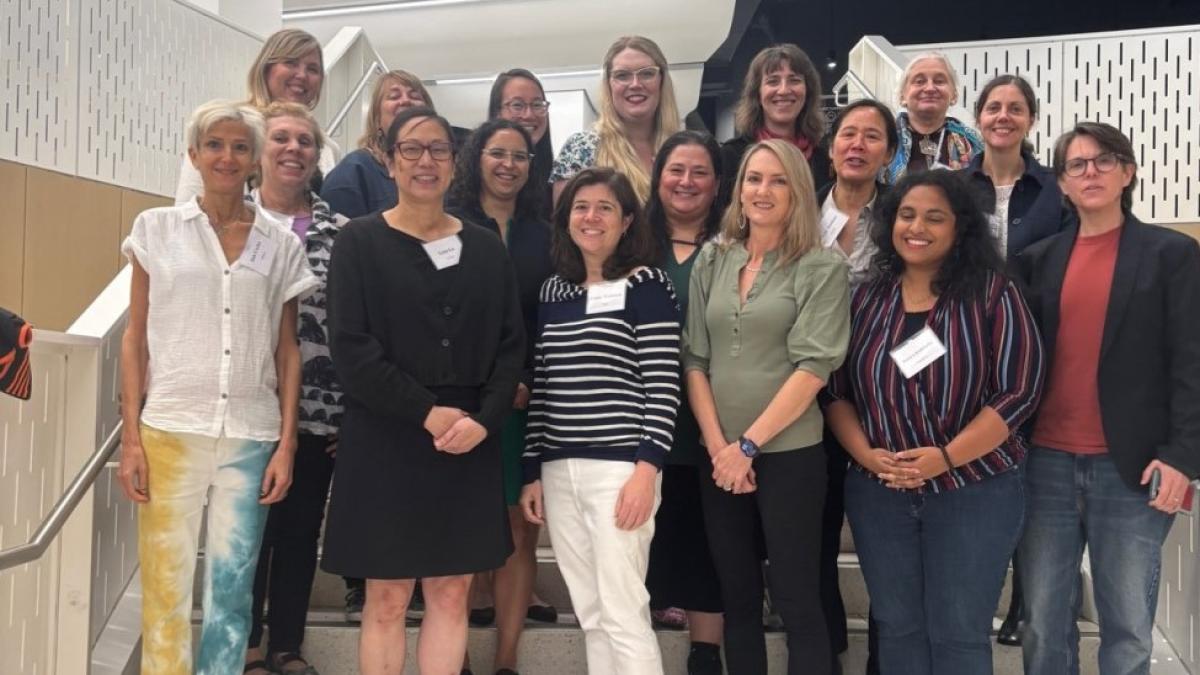
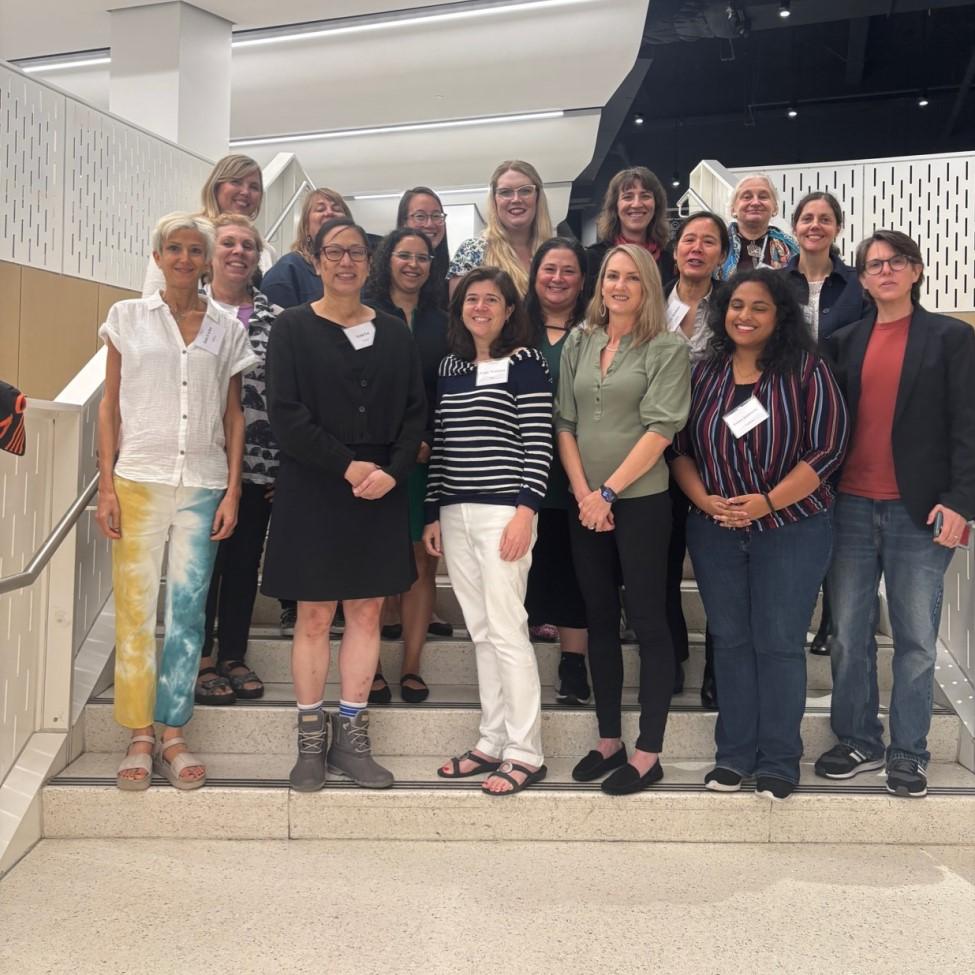
On June 16, 2025, the Elisabeth Haub School of Law at Pace University and Albany Law School cohosted a Feminist Legal Studies Roundtable at the Pace University campus in Lower Manhattan. Participants from Pace Haub Law included Professors Jessica Miles, Margot Pollans, and Emily Waldman. The event was convened by Professor Bridget Crawford and cosponsored by the US Feminist Judgments Project and the Law and Society Association’s International Research Collaborative on Feminist Judgments.
In this day-long program, nineteen faculty members from twelve schools presented works in progress that related in some way to women, gender & sexuality studies. During her opening remarks, Professor Crawford emphasized the value of shared scholarly inquiry. “Bringing together scholars committed to feminist legal analysis helps cultivate new insights and challenge traditional legal narratives,” she said. “In a time of rapid legal and political shifts—especially those impacting bodily autonomy, gender identity, and reproductive justice—convenings like this roundtable are more than collaborative opportunities; they are essential spaces for critical thinking, intellectual risk-taking, and mutual support. These gatherings help sharpen our tools, deepen our resolve, and move the field forward in ways that respond meaningfully to the world around us.”
Bringing together scholars committed to feminist legal analysis helps cultivate new insights and challenge traditional legal narratives.
Participating faculty members from other schools were: Noa Ben-Asher (St. John's), Cinnamon Carlarne (Albany), Mary Anne Case (Chicago), Dale Cecka (Albany), Liz Chen (Brooklyn), Tyler Rose Clemons(St. John's), Jenny-Brooke Condon (Seton Hall), Michelle Browning Coughlin (Northern Kentucky), Monica Iyer (Georgia State), Marcy Karin (Rutgers), Ramya Kudekallu (Cardozo), Lynn Lu (CUNY), Laura Rosenbury (Barnard), Cindy Soohoo (CUNY), and Carla Spivack (Albany).
The event was organized with the assistance of Pace Haub Law staff members Renee Brown-Cheng, Lauren Vaccaro, and Judy Jaeger.
Celebration and Impact: Spirit of Pace Awards 2025
At the 61st annual Spirit of Pace Awards dinner, held on June 12 at the American Museum of Natural History, more than 270 members of the extended Pace Community gathered in the iconic Irma and Paul Milstein Family Hall of Ocean Life to do just that: to make an extraordinary difference in the lives of our students while recognizing industry and alumni leaders who typify the values Pace holds most dear.
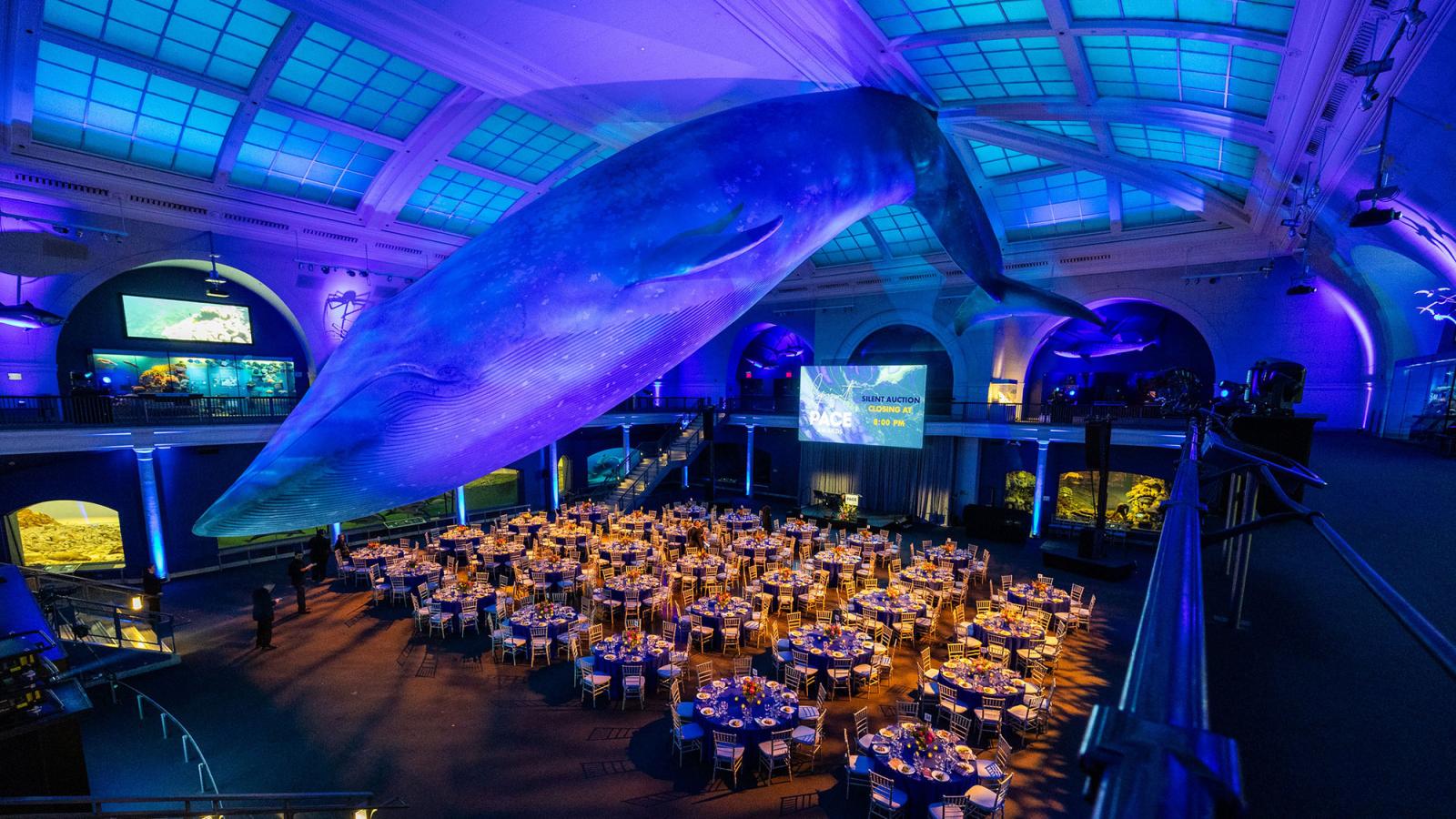
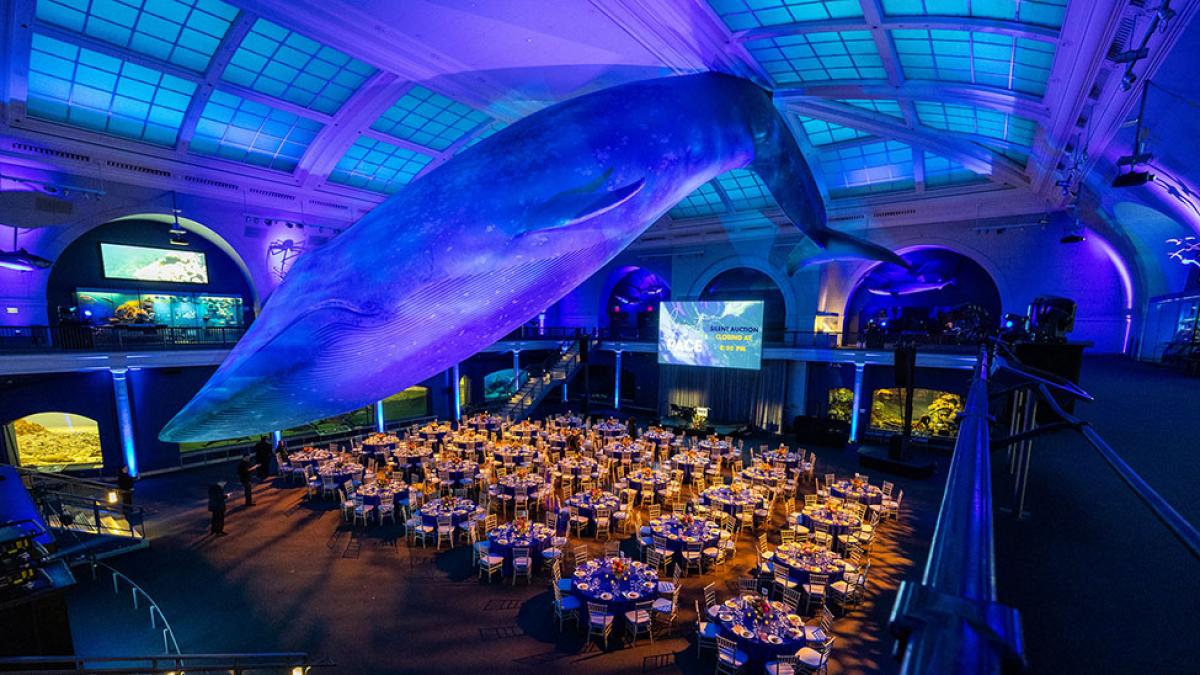
When the Pace Community comes together to support our students and celebrate our mission, we achieve extraordinary things for our University.
At the 61st annual Spirit of Pace Awards dinner, held on June 12 at the American Museum of Natural History, more than 270 members of the extended Pace Community gathered in the iconic Irma and Paul Milstein Family Hall of Ocean Life to do just that: to make an extraordinary difference in the lives of our students while recognizing industry and alumni leaders who typify the values Pace holds most dear.
Throughout the event, one message remained at the forefront: when it comes to building a brighter future for our students and their families, we all have an important role to play. And by the end of the evening, our community answered the call, raising $1 million in support of student scholarships and programs.
“This event is our chance to come together as one Pace Community—alumni, students, trustees, faculty, staff, and friends—and celebrate what makes Pace such a powerful place for learning and opportunity,” Pace University President Marvin Krislov said during his introductory remarks. “At Pace, we deliver education with purpose. Our students combine academic excellence with hands-on experience—and they succeed.”
Our four Spirit of Pace Awards honorees embody this commitment to excellence, exemplifying for our students—and for everyone at Pace—what it means to lead with innovation, vision, and steadfast belief in the importance of lifting others up.
This year’s Spirit of Pace Awards honorees were Lifetime Achievement Award-winner Michael Dowling, President and CEO, Northwell Health; Leaders in Management Award-winner Kristin Dolan, MS ’90, Chief Executive Officer, AMC Networks; Impact Award-winner Andreas C. Dracopoulos; Co-President, Stavros Niarchos Foundation (SNF); and Alumni of the Year Award-winner John Lyle ’66, philanthropist.
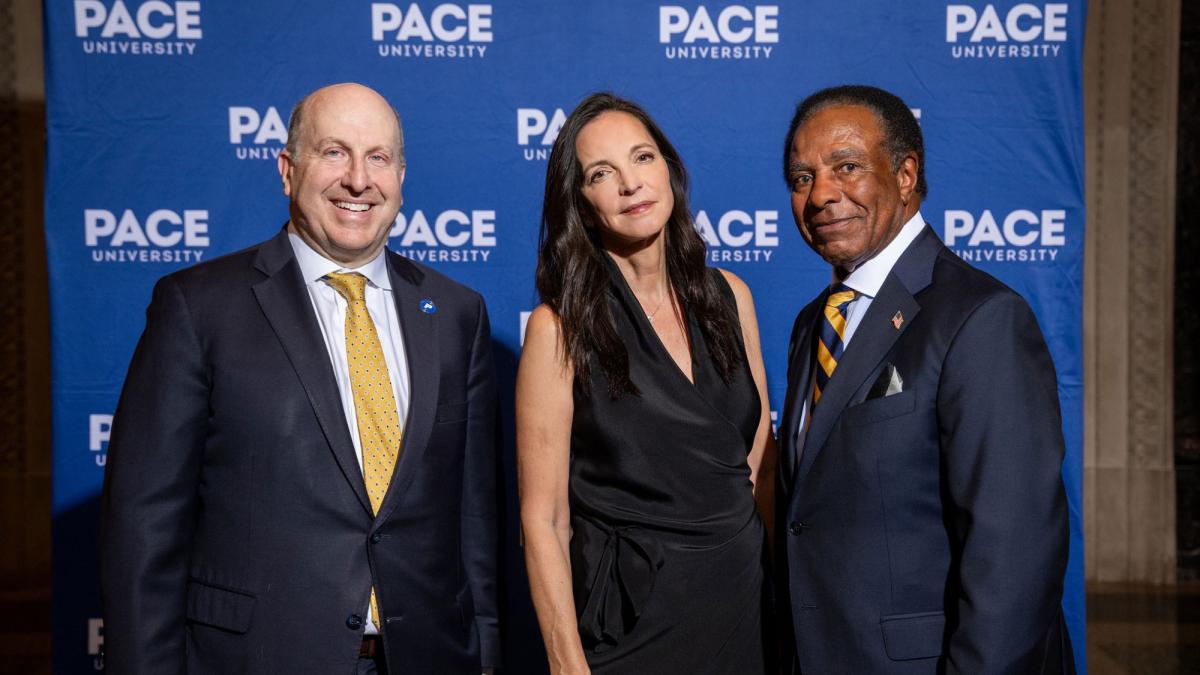
We were privileged to honor our exceptional 2025 honorees for their trailblazing career successes and their untiring philanthropic spirit. Thanks to their participation, and to everyone who attended and contributed to the event, the 2025 Spirit of Pace Awards was an unforgettable evening that will have a life-changing impact for Pace students today and in the years to come.
Highlights from the 2025 Spirit of Pace Awards
Alumni 2025 Awards Roundup
Each year, the Pace University Alumni Association presents awards to individuals who have made invaluable contributions to the University through their service, leadership, and dedication to the Pace mission.
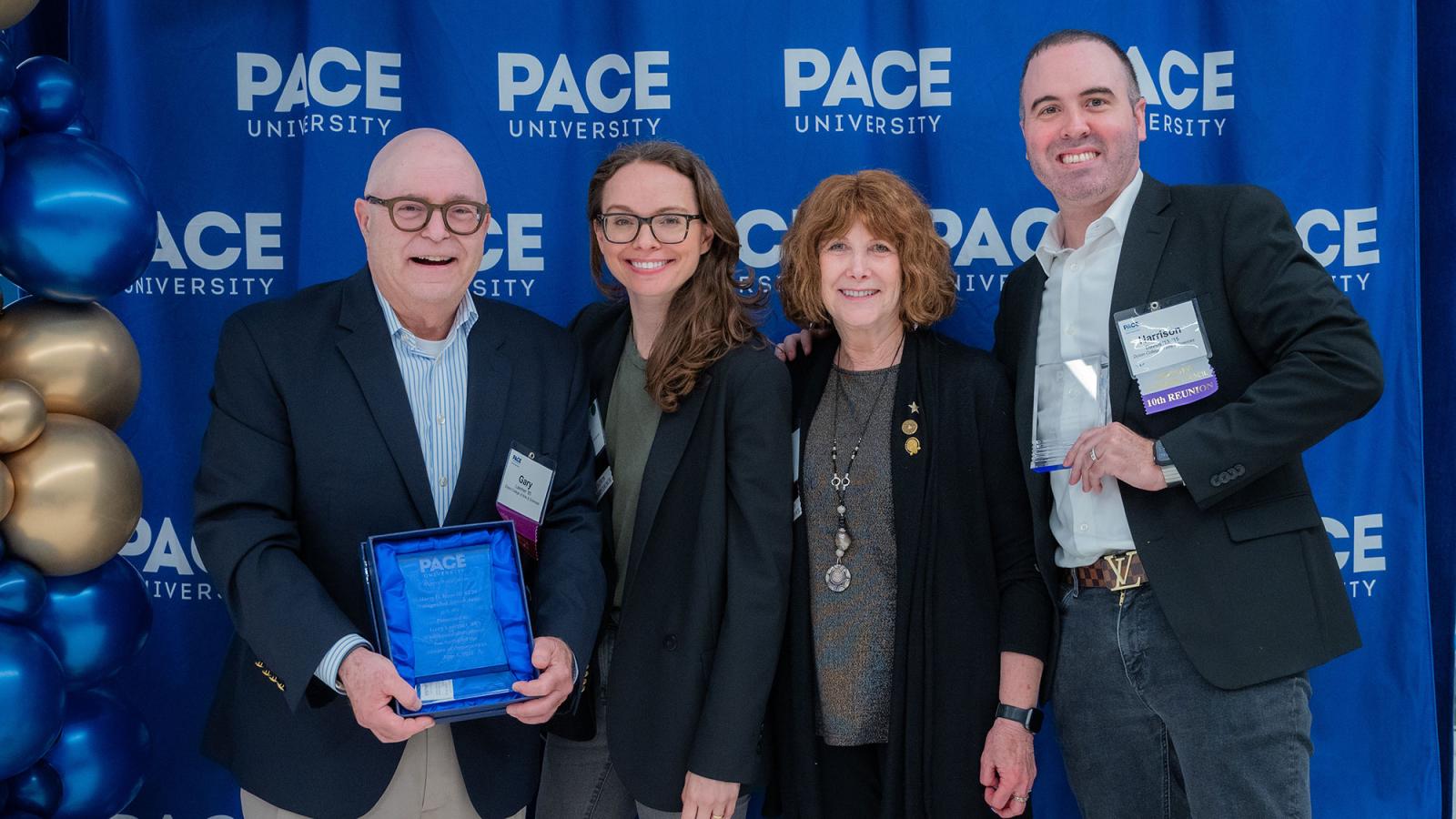
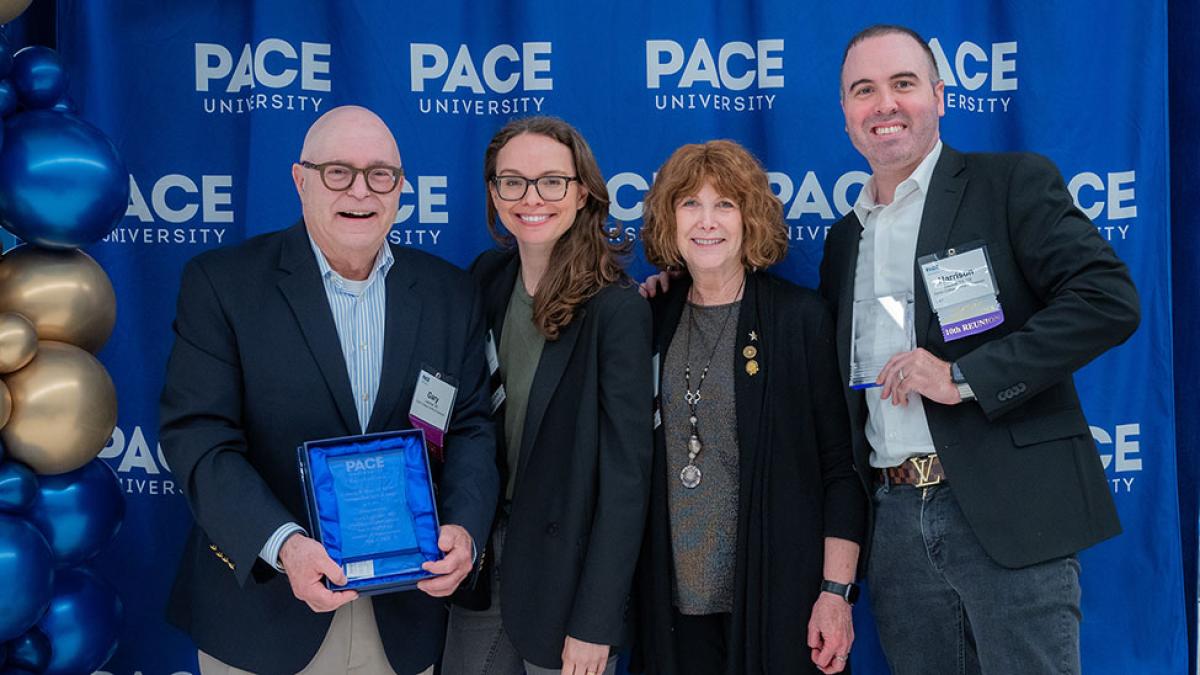
Each year, the Pace University Alumni Association presents awards to individuals who have made invaluable contributions to the University through their service, leadership, and dedication to the Pace mission.
Learn more about the 2025 Pace University alumni award recipients, the indelible impact they have made on the Pace Community, and the ways you can help create powerful experiences for all Pace alumni.
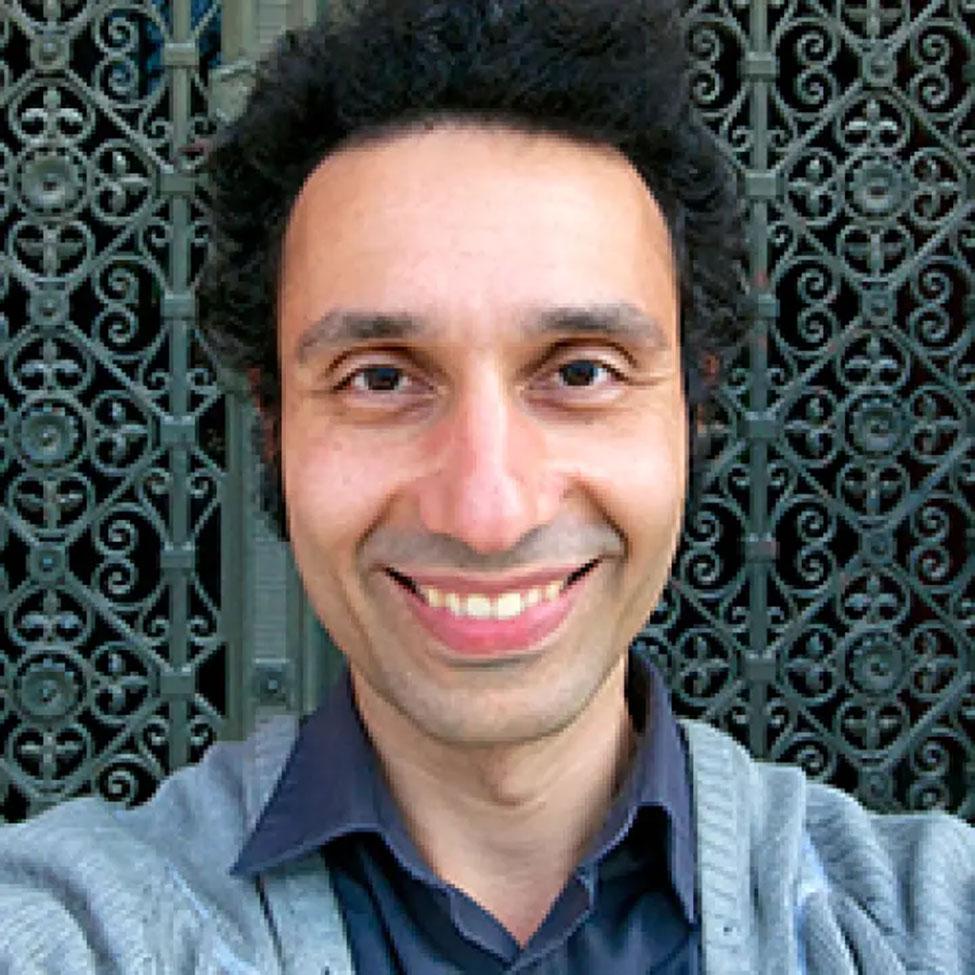
Homer and Charles Pace Faculty Award
Homer and Charles Pace Faculty Award honors a faculty member nominated by Pace alumni who embodies our mission of Opportunitas, serving as an inspiring role model, motivating their students, and going above and beyond to support Pace student success. This year, the Homer and Charles Pace Faculty Award was presented to Associate Professor and Department Chair of Biology at the Dyson College of Arts and Sciences, Zafir Buraei. His work focuses on elucidating the molecular mechanisms of cardiovascular and neurological disease. He previously received Pace’s Outstanding Advisor Award in 2018.
Gold Alumni Service Award
Graduates of the Last Decade (GOLD) Committee Chair, Gabriella Ferrara '16, was honored at Reunion with the inaugural GOLD Alumni Service Award. Specifically for graduates of the last decade, this award recognizes alumni who have demonstrated exceptional service and commitment in the years immediately following their undergraduate education. The recipient embodies the spirit of Opportunitas by making meaningful contributions to the Pace Alumni Association and inspiring fellow alumni to do the same. Through her volunteer work with the Alumni Association, Gabriella has been instrumental in facilitating programming and connections amongst GOLD alumni, laying the foundation for a stronger Pace alumni community for years to come.
Watch Gabriella’s acceptance remarks!
Emerging Alumni Leader Award
At Pace’s 2025 Reunion, Harrison C. Davies ’13, ’15 became the first-ever recipient of the Emerging Alumni Leader Award. This brand-new award will be presented annually and honors an alumni volunteer who has rekindled their commitment to the University through exemplary leadership and alumni advocacy. It recognizes those who have demonstrated exceptional initiative in advancing Pace’s mission of Opportunitas and supporting the Pace Alumni Association. As Chair of the Dyson College of Arts and Sciences and School of Education Alumni Association Committee, Harrison has made strides to strengthen ties across a large and exceptionally diverse alumni group, creating pathways to innovative new highly engaging programs and promote cross-disciplinary collaboration.
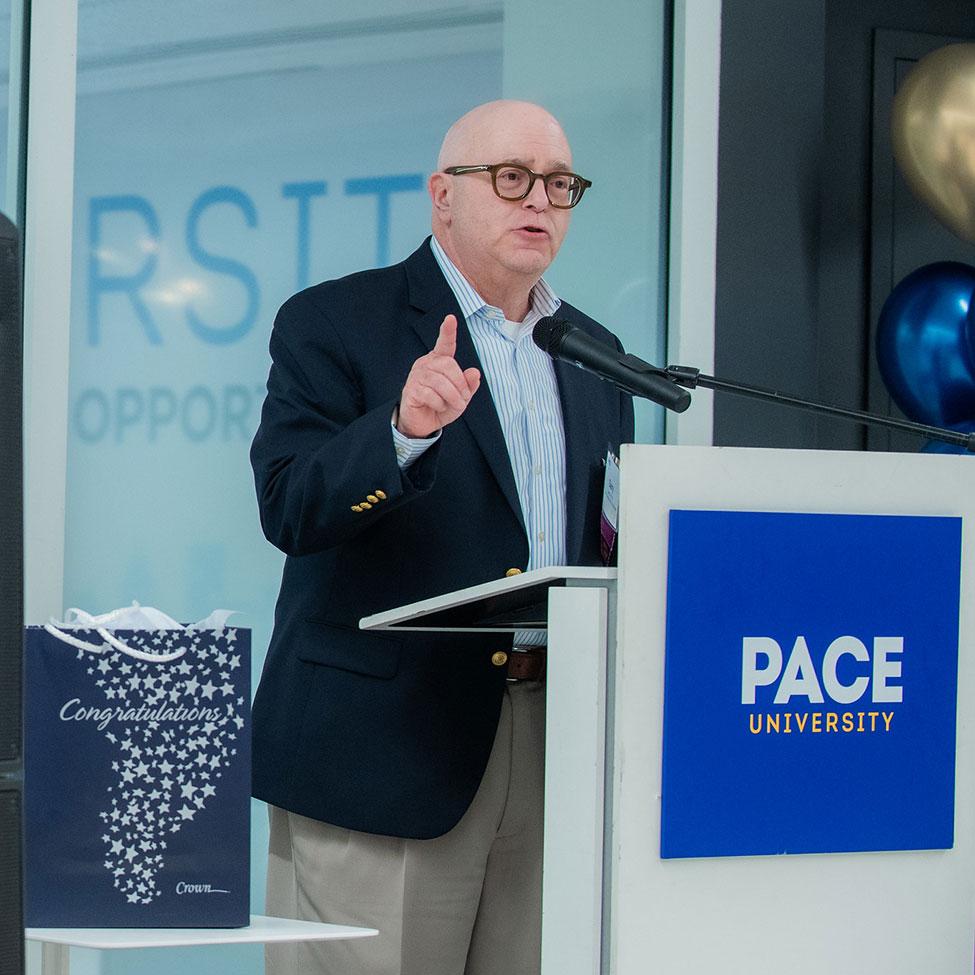
Harry D. Mayo III '61, '78 Distinguished Service Award
Former Vice President of Pace University Development and Alumni Relations Gary Laermer ’80 was presented with Harry D. Mayo III ’61, ’78 Distinguished Service Award at Reunion 2025. Named in honor of its committed and inspirational first recipient, the Harry D. Mayo III ’61, ’78 Distinguished Service Award is presented annually to a Pace graduate whose consistent volunteer service has aided in advancing the success of Pace’s mission of Opportunitas and the Pace Alumni Association. As VP, Gary spearheaded the transformation of Pace’s philanthropic and charitable giving programs, launching the historic $300 million Campaign for Pace University. He retired from his role at Pace in January 2025, leaving the University stronger and better positioned for future success, and having empowered countless Pace students to achieve their full potential.
Alumni of the Year Award
John Lyle ’66, Philanthropist, was honored with Pace’s Alumni of the Year Award at the June 2025 Spirit of Pace Awards ceremony. With more than 40 years of generous philanthropic support of the Pace mission, John has distinguished himself as among the most dedicated and impactful individual benefactors in the history of the University. As a recipient of the 2025 Alumni of the Year Award, John demonstrates the extraordinary things that can be achieved through a spirit of philanthropy and an enduring belief in the power of education to uplift and transform lives
Ways to Get Involved
- Alumni Association: The Pace University Alumni Association creates a space for alumni to engage with each other, current students, and the University to enrich the alumni experience.
- Affinity Groups: Through a Pace Affinity Group, you can connect with alumni, students, faculty, and staff members who enjoy similar passions, professions, and personal interests.
- Graduates of the Last Decade (GOLD): GOLD, is a network for Pace University undergraduate alumni of the last ten years. Giving alumni the opportunity to network with each other, both personally and professionally, connect with current students, and foster a lifelong relationship with Pace through events, volunteer opportunities, and giving.
- Mentor: Join Setter Connect and become the spark in a student's life as an alumni mentor and help guide them as they embark on their careers.
Reunion 2025 Recap
One Pace Plaza was brimming with celebration and cheer on June 5, 2025, as almost 200 Pace alumni returned to the New York City Campus to reconnect with old friends and classmates, reflect on shared histories and experiences, and toast the continued strength of the Pace Community.
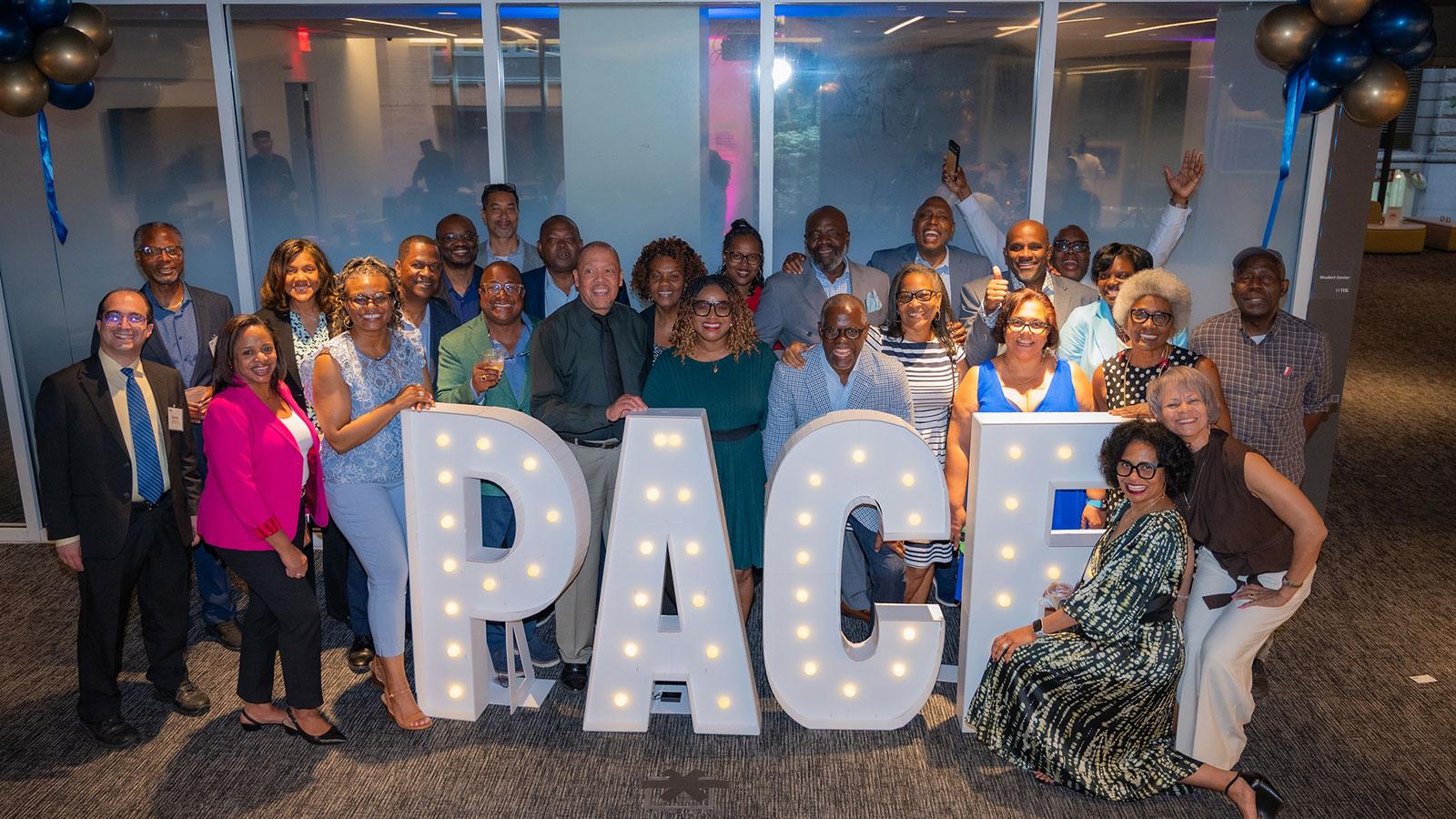
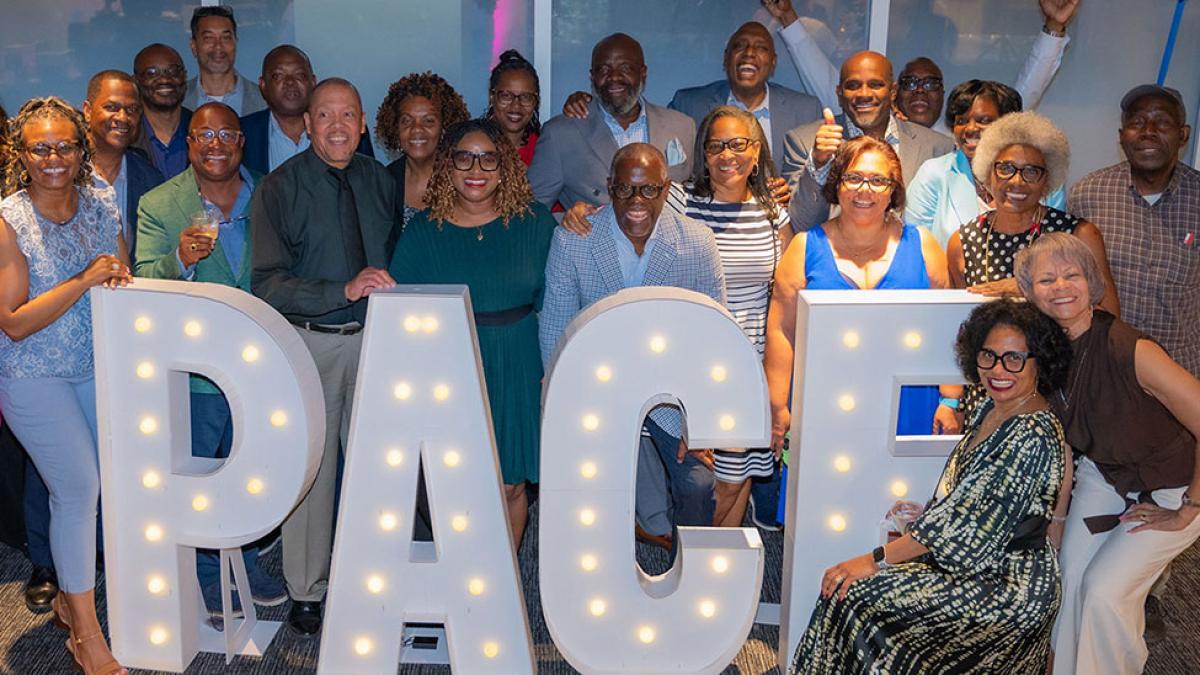
One Pace Plaza was brimming with celebration and cheer on June 5, 2025, as almost 200 Pace alumni returned to the New York City Campus to reconnect with old friends and classmates, reflect on shared histories and experiences, and toast the continued strength of the Pace Community.
This year, we recognized those milestone reunions ending in 5s and 0s, Pace’s thriving Alumni Affinity Groups, the 40th anniversary of the MS in Publishing Program, our rich community of Caribbean alumni, and the 2025 recipient of the Harry D. Mayo III ’61 ’78 Distinguished Service Award.
Additionally, our community came together during the event to celebrate the inaugural recipients of the Emerging Alumni Leader Award and the GOLD Alumni Service Award. The inaugural Emerging Alumni Leader Award was conferred to Harrison C. Davies ’13 in recognition of his exceptional leadership and initiative in advancing Pace’s mission of Opportunitas and supporting the Pace Alumni Association. The GOLD Alumni Service Award was conferred to Gabriella Ferrara ’16 in recognition of her remarkable service, commitment, and contributions to the Pace Alumni Association in the years after her graduation and her outstanding work inspiring fellow recent alumni to do deepen their involvement with the University.
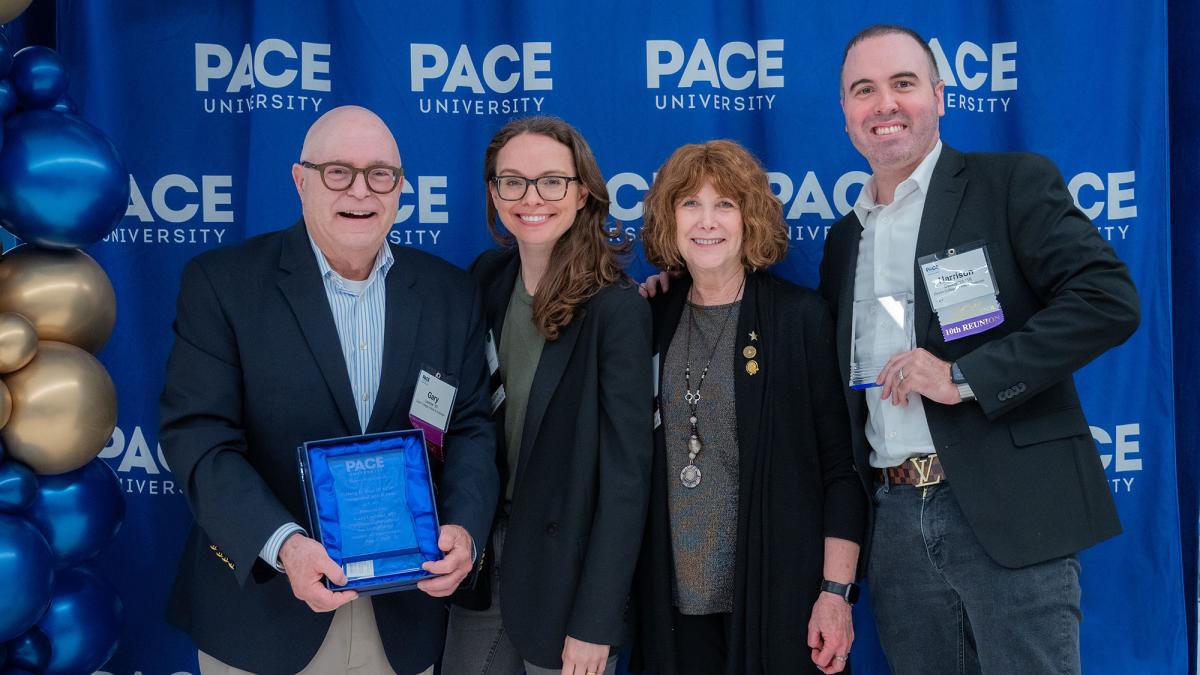
Harry D. Mayo III ’61 ’78 Distinguished Service Award
Congratulations to the 2024 Harry D. Mayo III ’61 ’78 Distinguished Service Award honoree, Gary Laermer '80. Gary served as Pace University’s vice president of Development and Alumni Relations from 2018 until December 2024. In that time, and under the leadership of Pace President Marvin Krislov and following approval by the Pace Board of Trustees, Gary and the Pace development team launched the historic $300 million Campaign for Pace University. This campaign marked an extraordinary period of success, with Gary and the development professionals setting multiple fundraising records and bringing the campaign’s ambitious goals well within reach.

Gary’s tenure was also marked by the establishment of the first collective Pace University Alumni Association, a community-building initiative that deepened alumni engagement and expanded volunteer opportunities. Amid the challenges of the COVID-19 pandemic, Gary helped lead a University-wide response that secured record-breaking contributions to emergency student support funds and launched initiatives such as the Community Impact Internship program, which places Pace students in paid internships with community nonprofits.
Above all, Gary’s leadership was defined by his unwavering commitment to community, student success, and the University’s mission of Opportunitas. During his tenure, the Office of Development and Alumni Relations raised more than $140 million to advance the University, including over $40 million in scholarship support—expanding access to a Pace education and reinforcing the University’s status as a leader in social mobility.
